On Mount Emei: Times I Wish I'd Packed Lighter
27 Jun 2014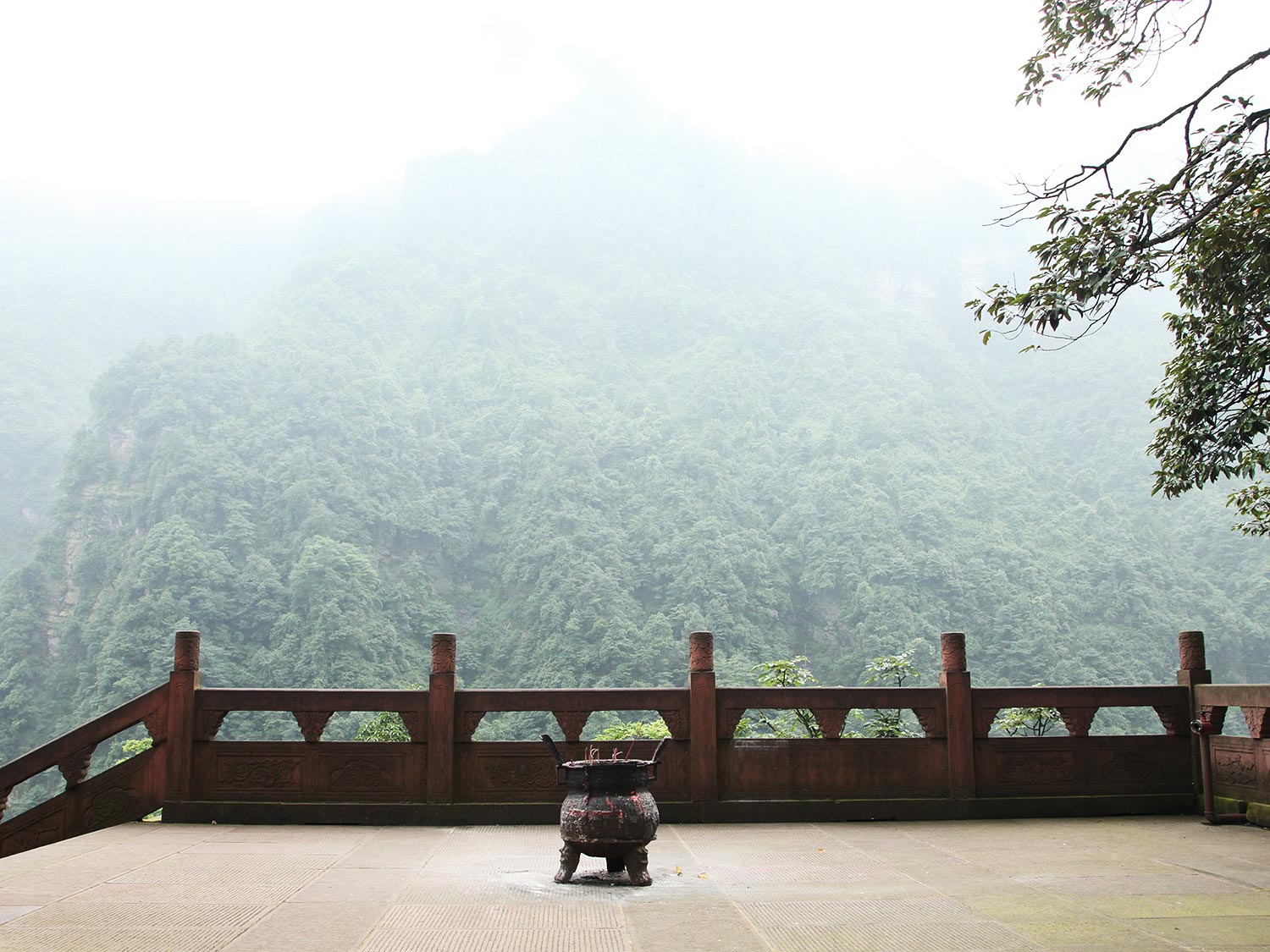
After some wildly delicious food in Chengdu, Adri and I made our way over to Emei Shan, one of the four holy Buddhist mountain sites in China, and a place of unspeakable natural beauty.
The town of Emei itself is not much to look at or visit. People use it and the nearby town of Baoguo village as their base camp when taking the multi-day trek up and down Mt. Emei. Covered in fir, cedar, and bamboo trees, the mountain is over 3,000 meters tall, and while the path up and down the mountain is paved in stone and has resting points ever few kilometers, it's still a good 30 kilometer trek during which time you're constantly going up and down stairs and takes most young folks a good 10 to 12 hours to complete one-way.
In other words, it's not the kind of climb an out-of-shape food-writing schlub like myself should take on lightly.
With limited time, Adri and I wisely decided that the best way for us to see the whole trail without spending three days on the mountain would be to get a ride to the very impressive Jinding temple at the top via a combination of bus and cable car, then walk down over the course of two days, spending the night at one of several wooden temples along the path down.
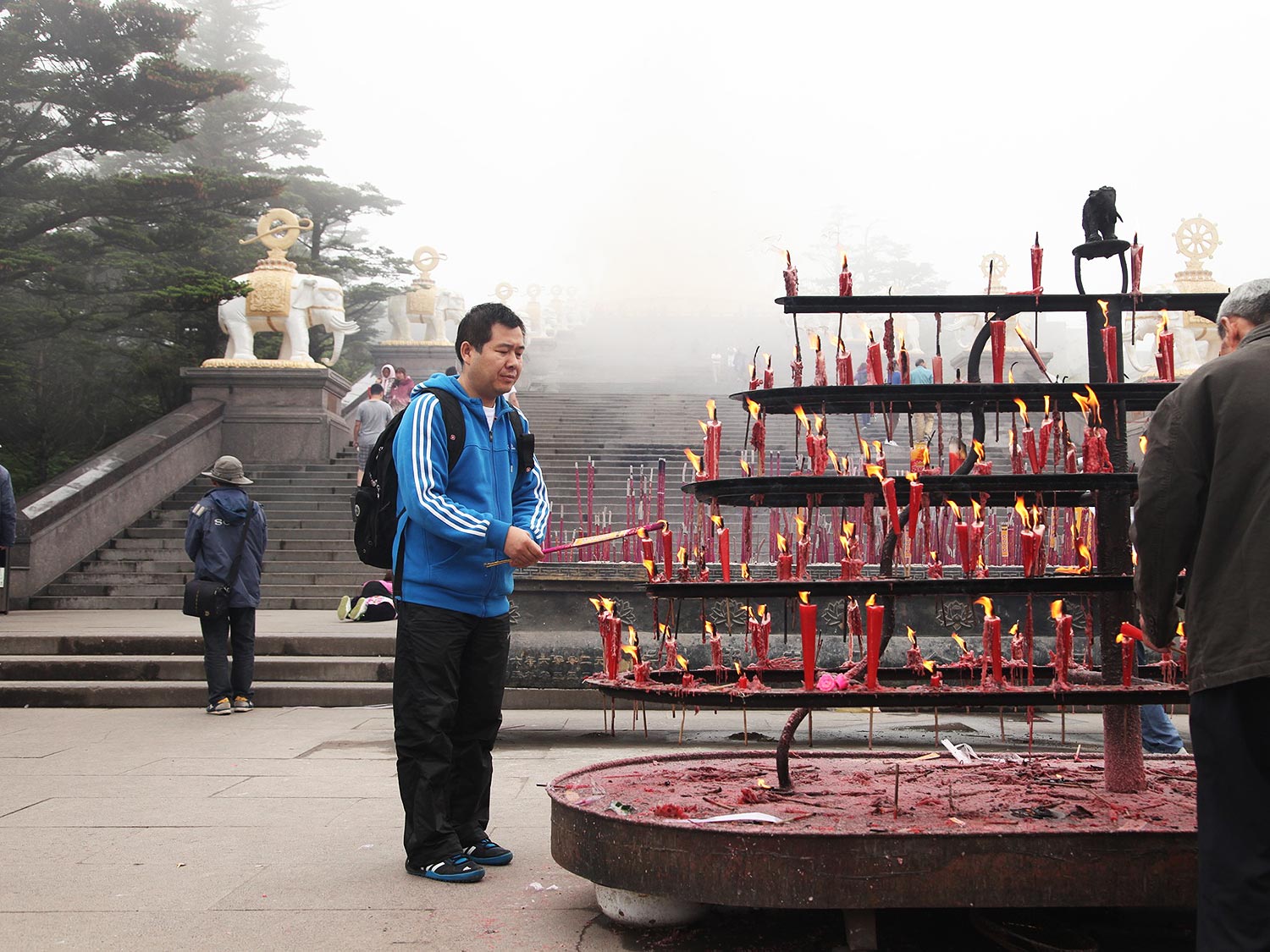
The first part of the trip—taking the bus and cable car up—went exactly as planned.
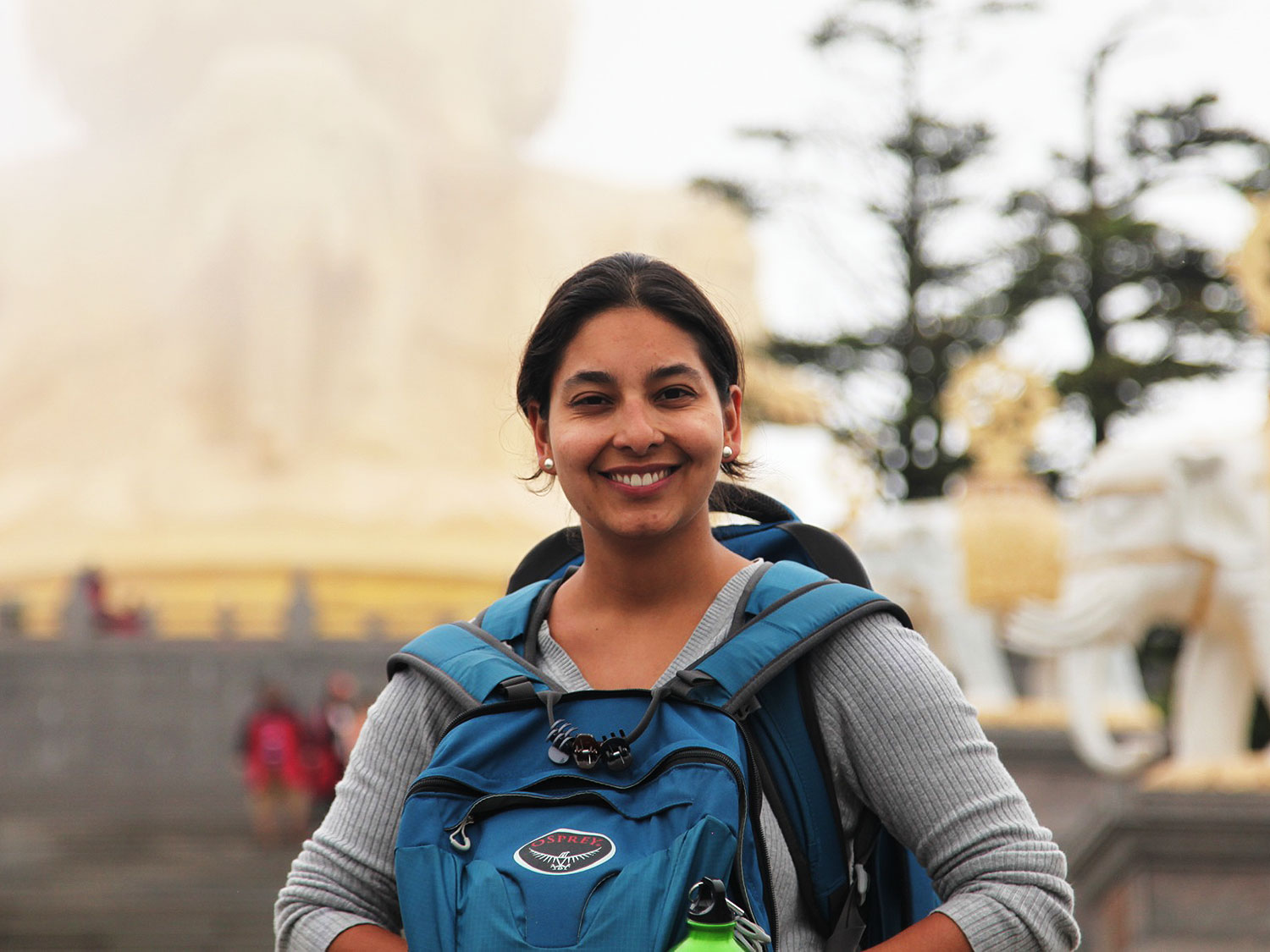
We arrived at the top in the early afternoon, the giant 48-meter-tall multi-dimensional Samantabhadra looming out through the mist as dozens of the devout walked slowly towards it, kneeling to pray with each step.
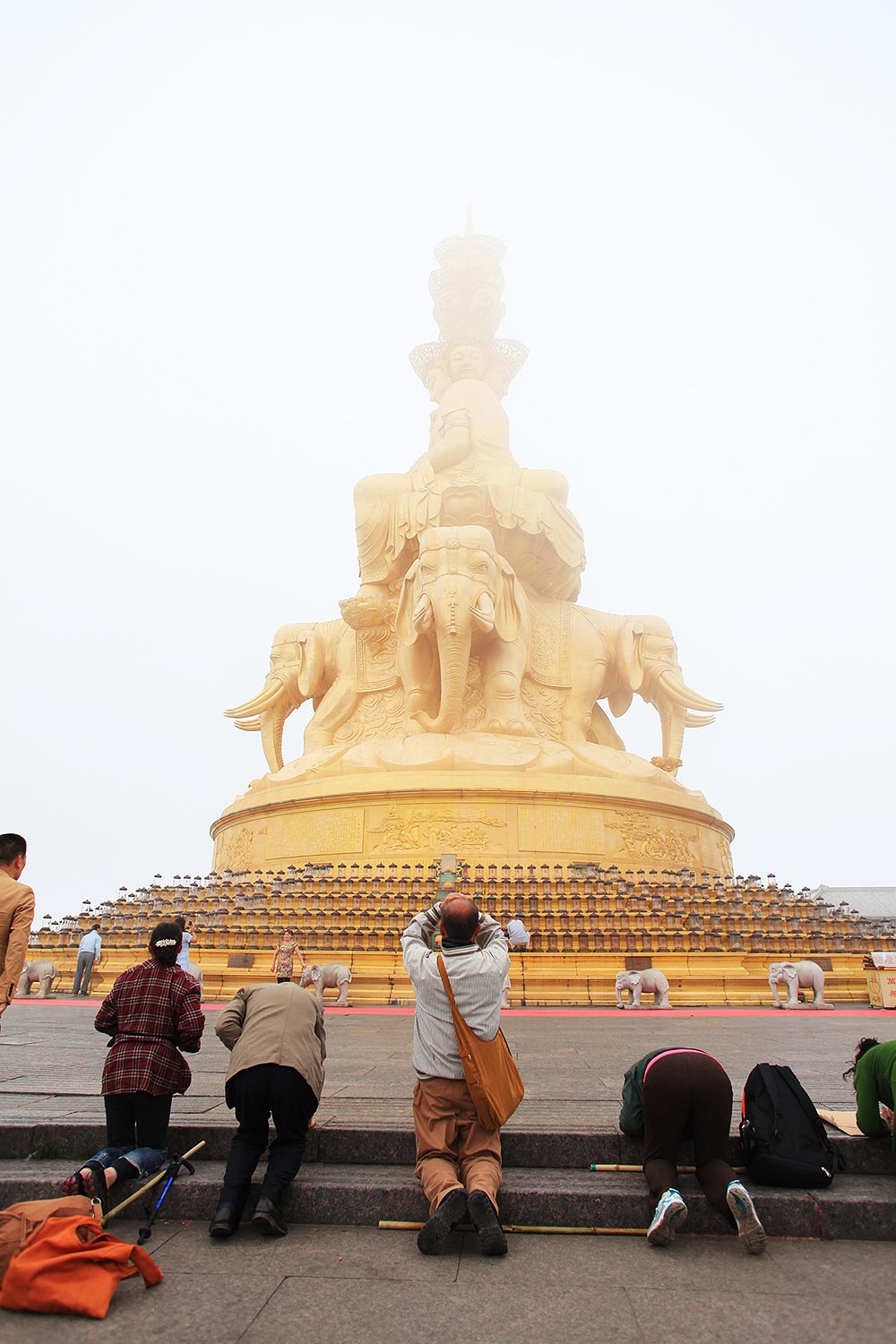
The statue, though not particularly old, is nonetheless striking in its scale and craftsmanship.
Look straight ahead, and that's what you see. But glance over to your right, and you've got this:
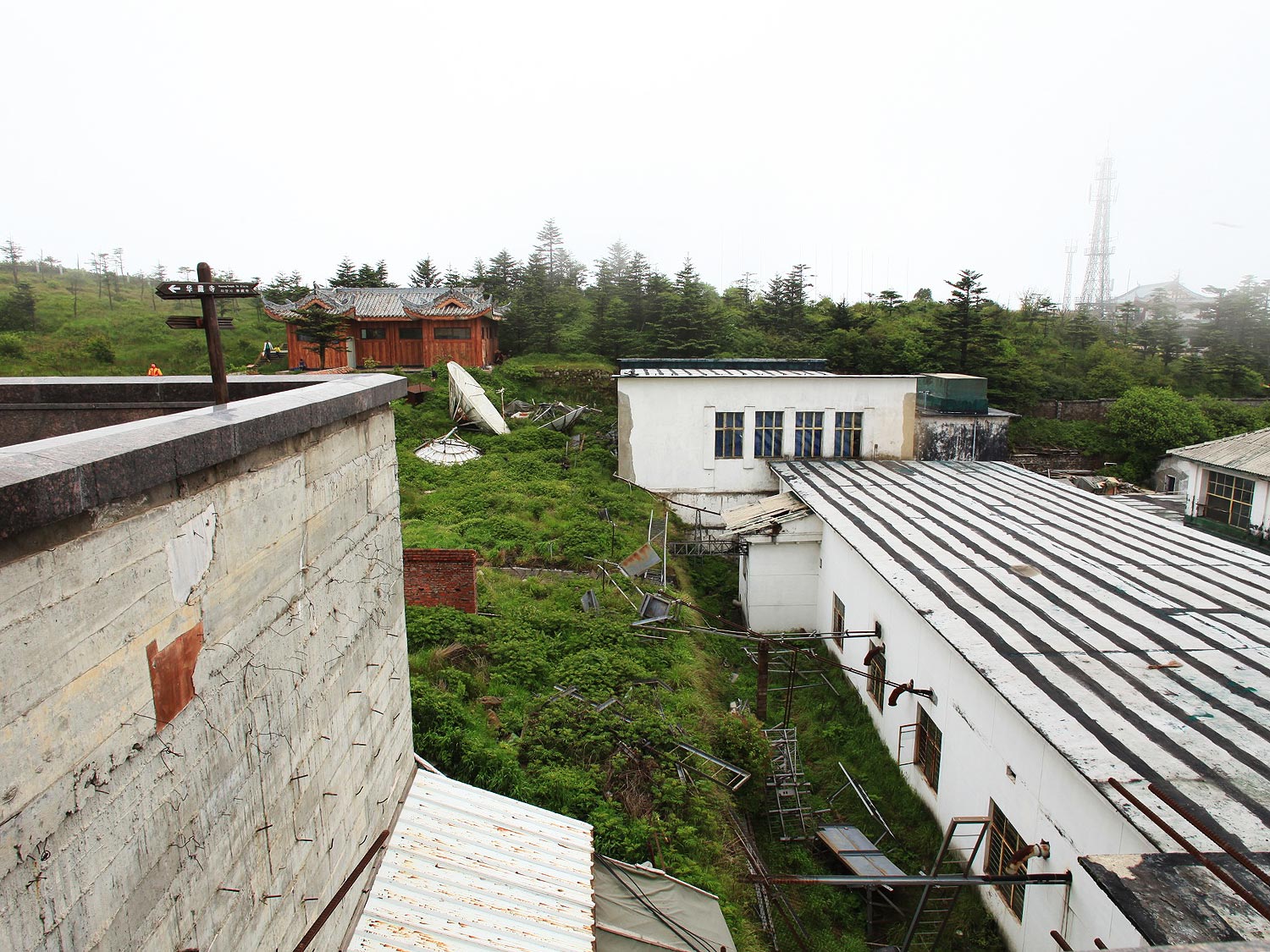
As often happened in China, I found the juxtaposition between the most beautiful and the ugliest bits of human creation to be almost comical, though not as comical as I found this sign to be:
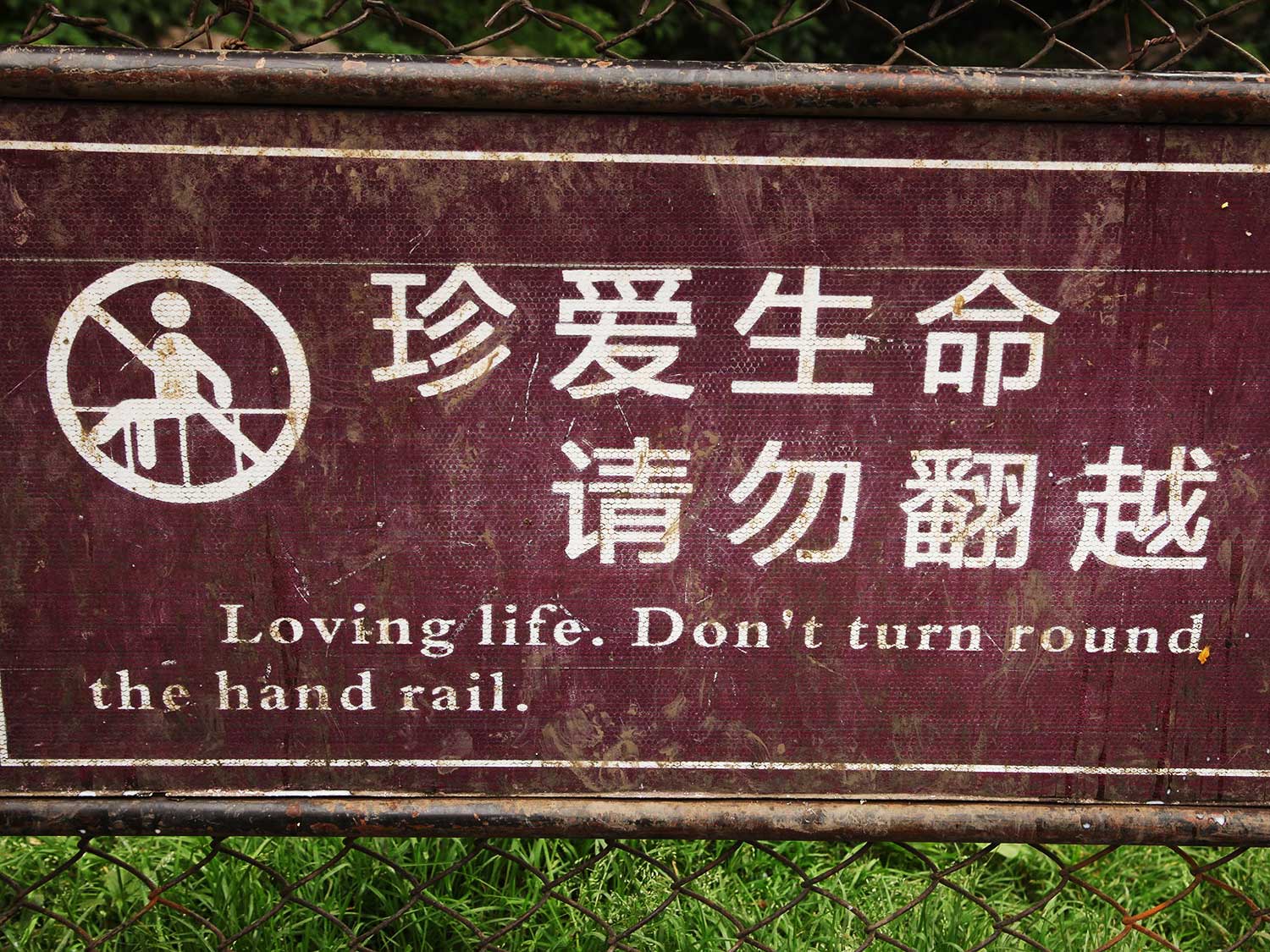
Good advice.
The tourists are thick at the bus-accessible portion of the mountain, and hawkers selling pork belly, smoked sausage flavored with Sichuan peppercorns, and fried arepa-like corn cakes are as dense on the ground as the piles of empty plastic bags and bottles that litter the sides of the trail.
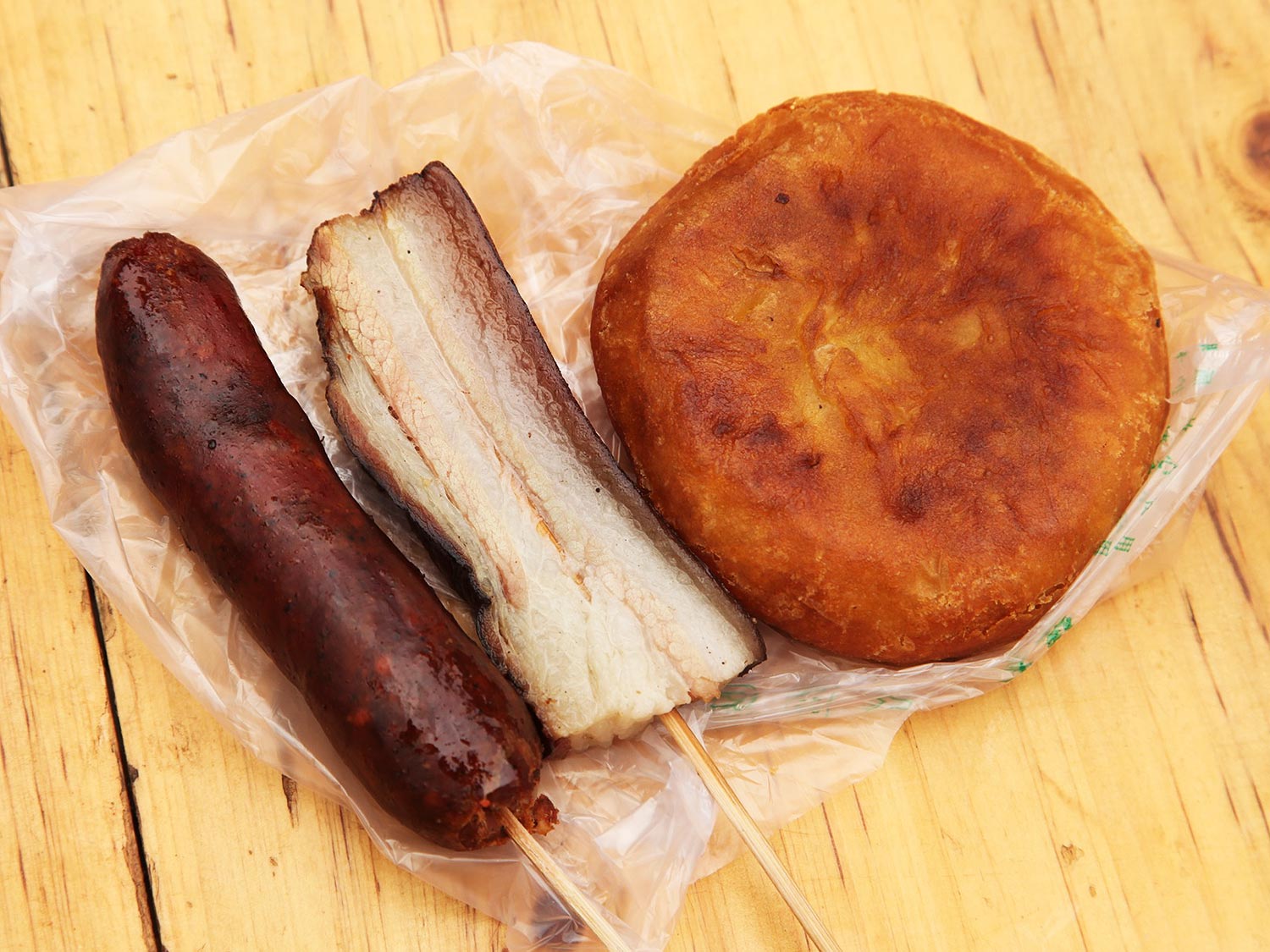
Looking at the piles of non-biodegradable trash that blanketed one of the holiest sites in China, I couldn't help muttering to Adri man, people are assholes.
It was only later, after we'd left the throngs of tourists and settled into the first hour of our real walk that we realized it wasn't actually the people who were assholes, it was these guys:
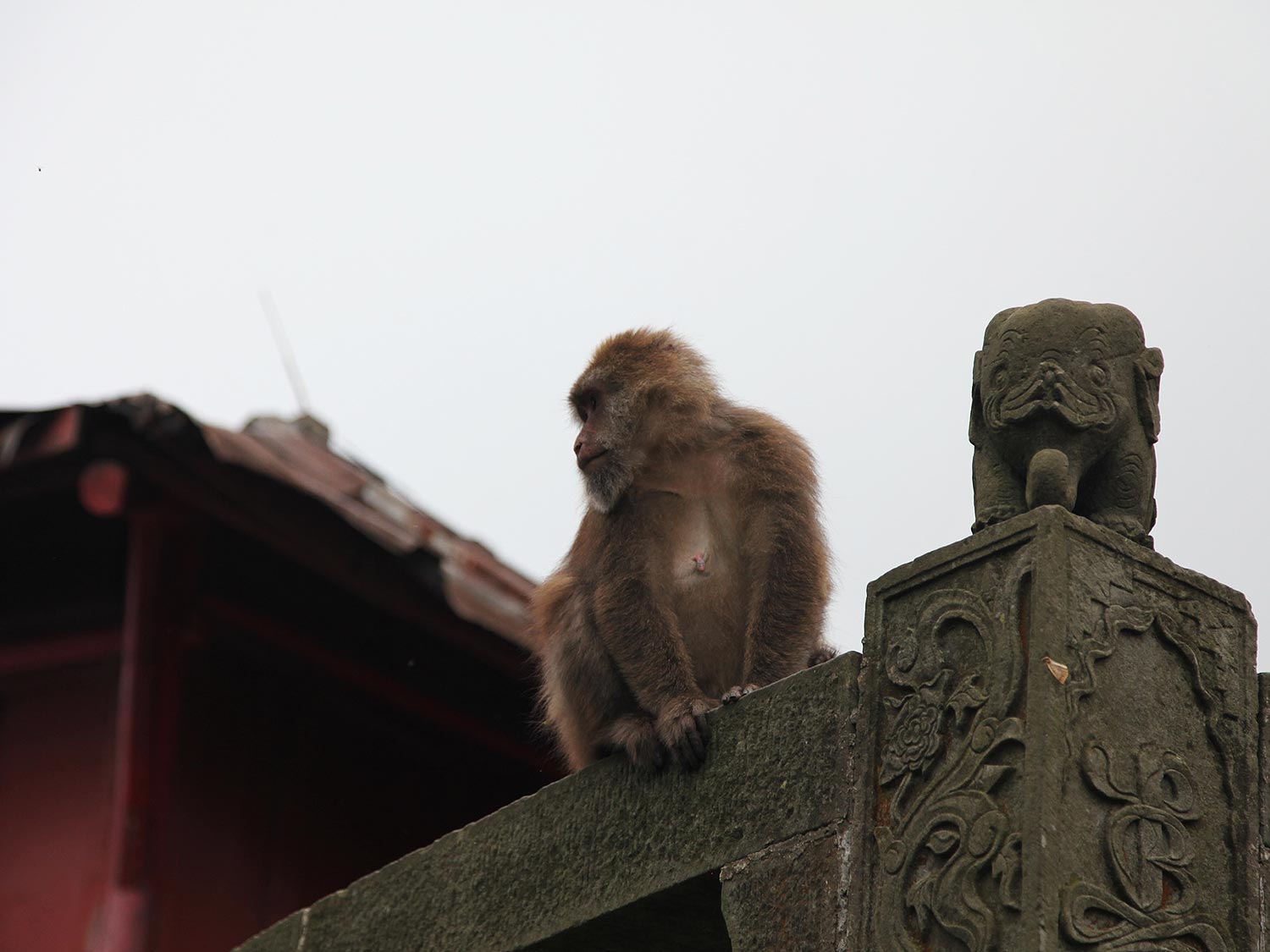
The macaques that hang out near the base and summit of the mountain, as well as at a few of the temples along the way, are, to put it bluntly, jerks.
To put it not so bluntly, they are complete, utter assholes with no manners, compassion, or basic sense of decency whatsoever who would happily rip a baby out of its mother's arms if it thought that it could get a potato chip out of the process. The worst part is, they're crafty and bold to boot.
Those snack wrappers and empty bottles littered along the side of the trail? Those aren't from people throwing them out, they're from monkeys stealing them from people and throwing them out. I know this, because I was a victim of such a crime. The tube of Finger Licking Braised Pork Flavor Lay's Stax that I'd carried with me all the way from Xi'an, and which was intended to provide me with sustenance for the first day of trekking was stolen out of my bag by this jerk here:
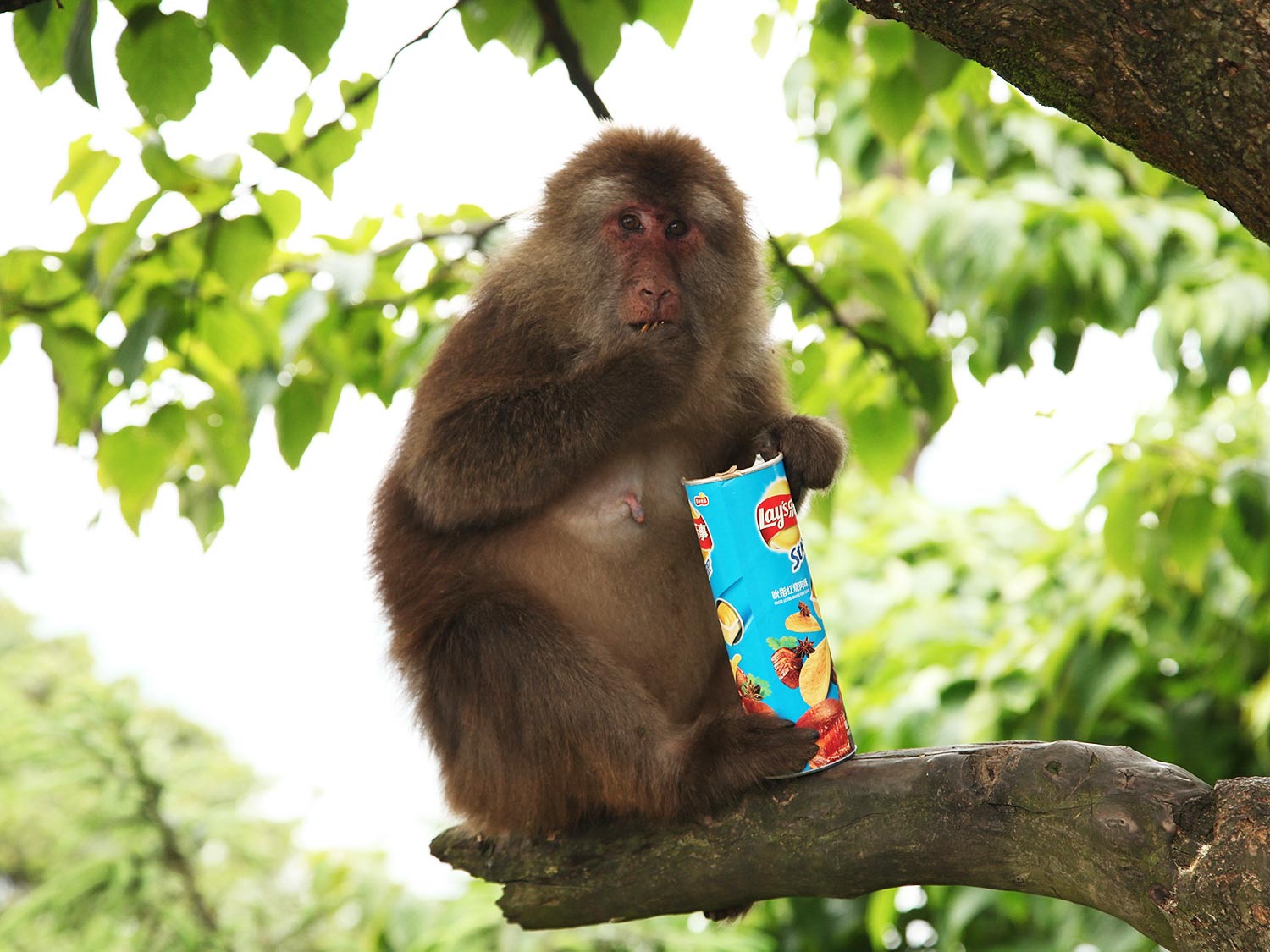
She just walked right up, hissed at me, bared her teeth, jumped onto my bakpack, stuck her hands in and fished around, grabbed the Lays, and took them to a tree, sitting down right by this sign:
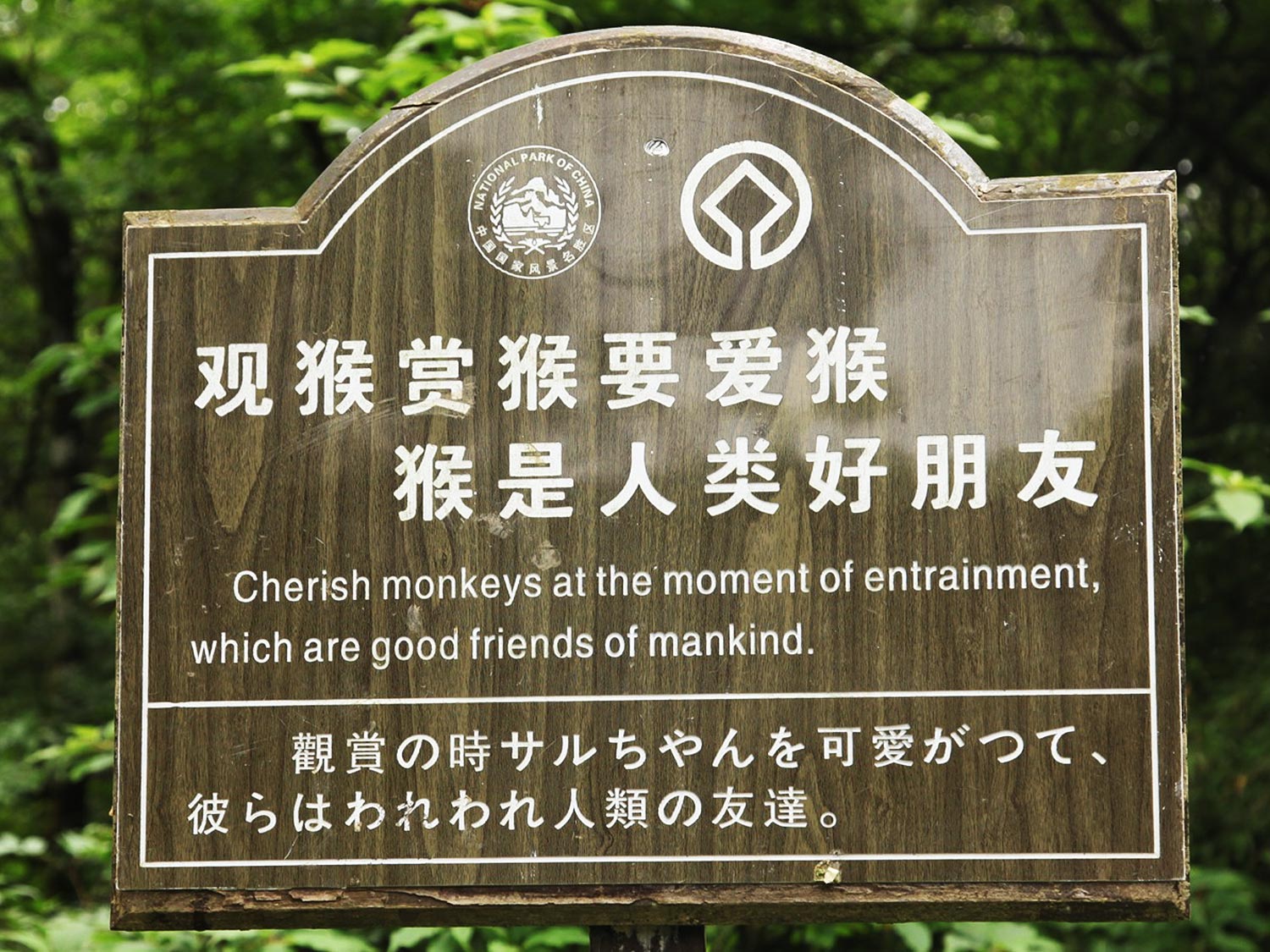
You know how I've mentioned that nobody in China seems to follow posted signs? I couldn't help but to think that perhaps the monkeys are learning from us as I watched that monkey eat my chips one by one, daring me to do something about it.
Good friends of mankind, my ass.
But it's hard to stay mad at a monkey when you're surrounded by gorgeous things like this temple built into the side of a mountain, which despite bing run down, still makes you think about the effort that went into building it in the first place.
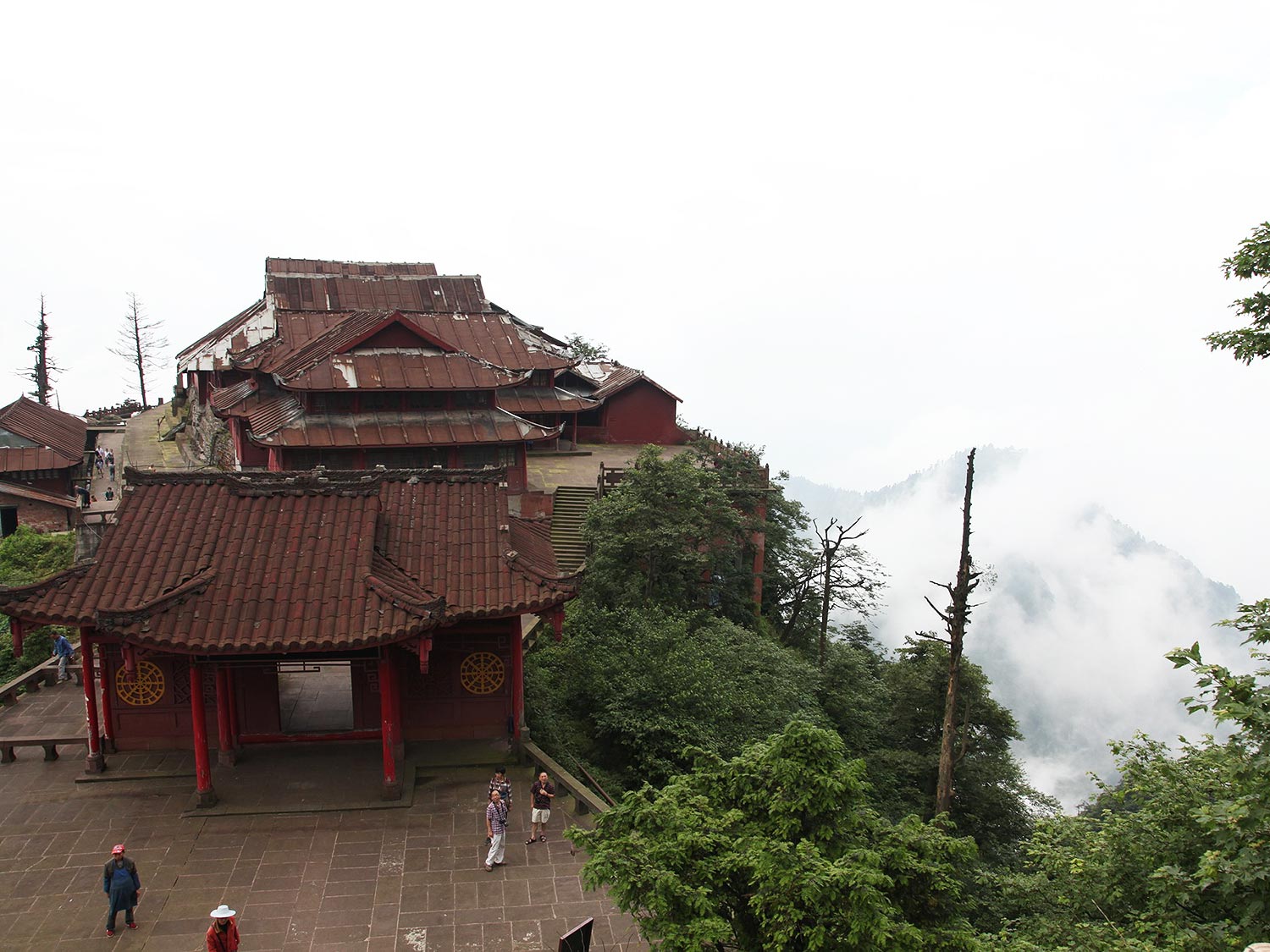
And of course, the natural beauty can't be beat:
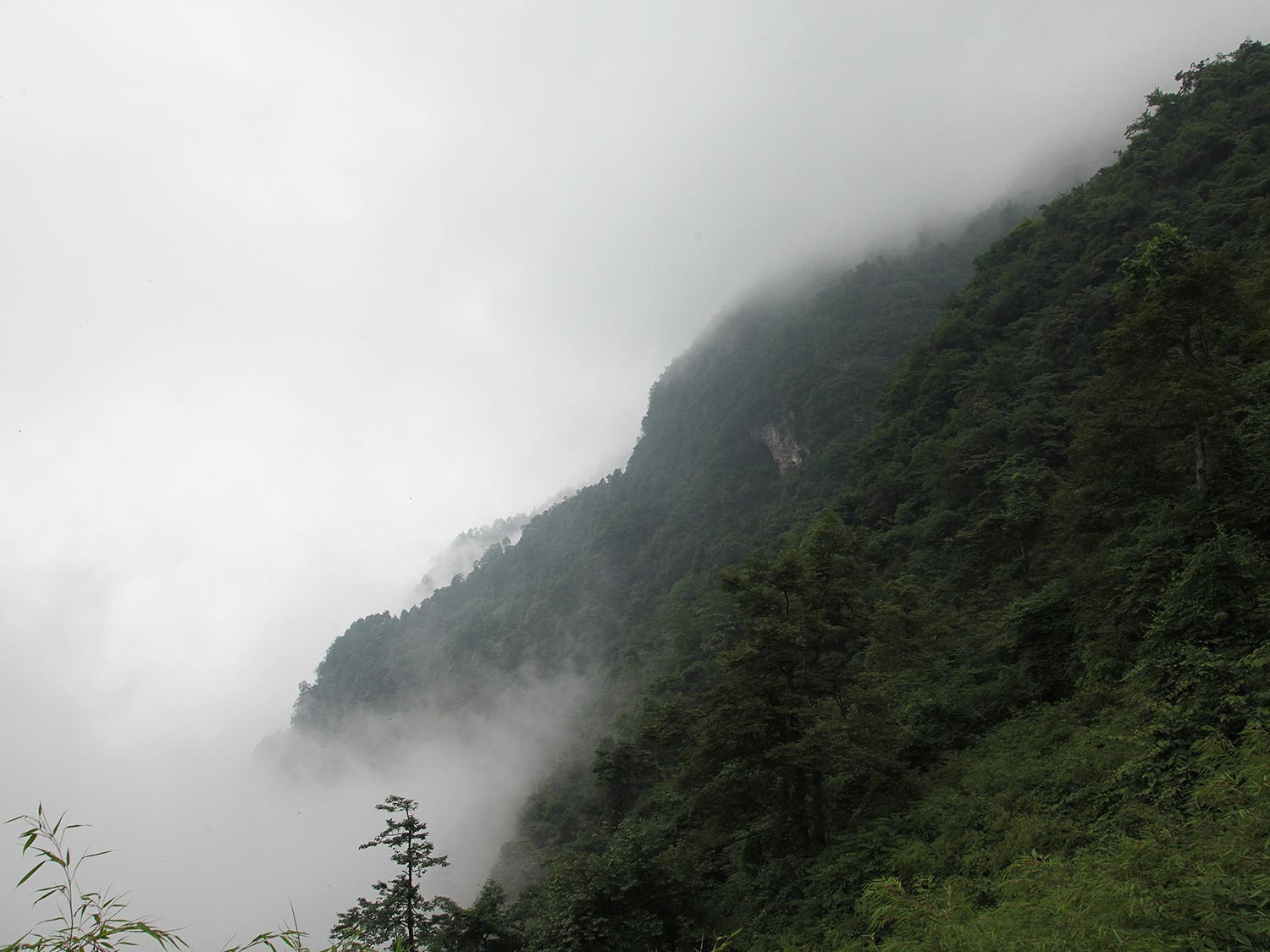
The mountain spent almost all day shrouded in mist—as it is 6 out of 7 days a week—but the mist got thicker and thicker as the day drew to a close
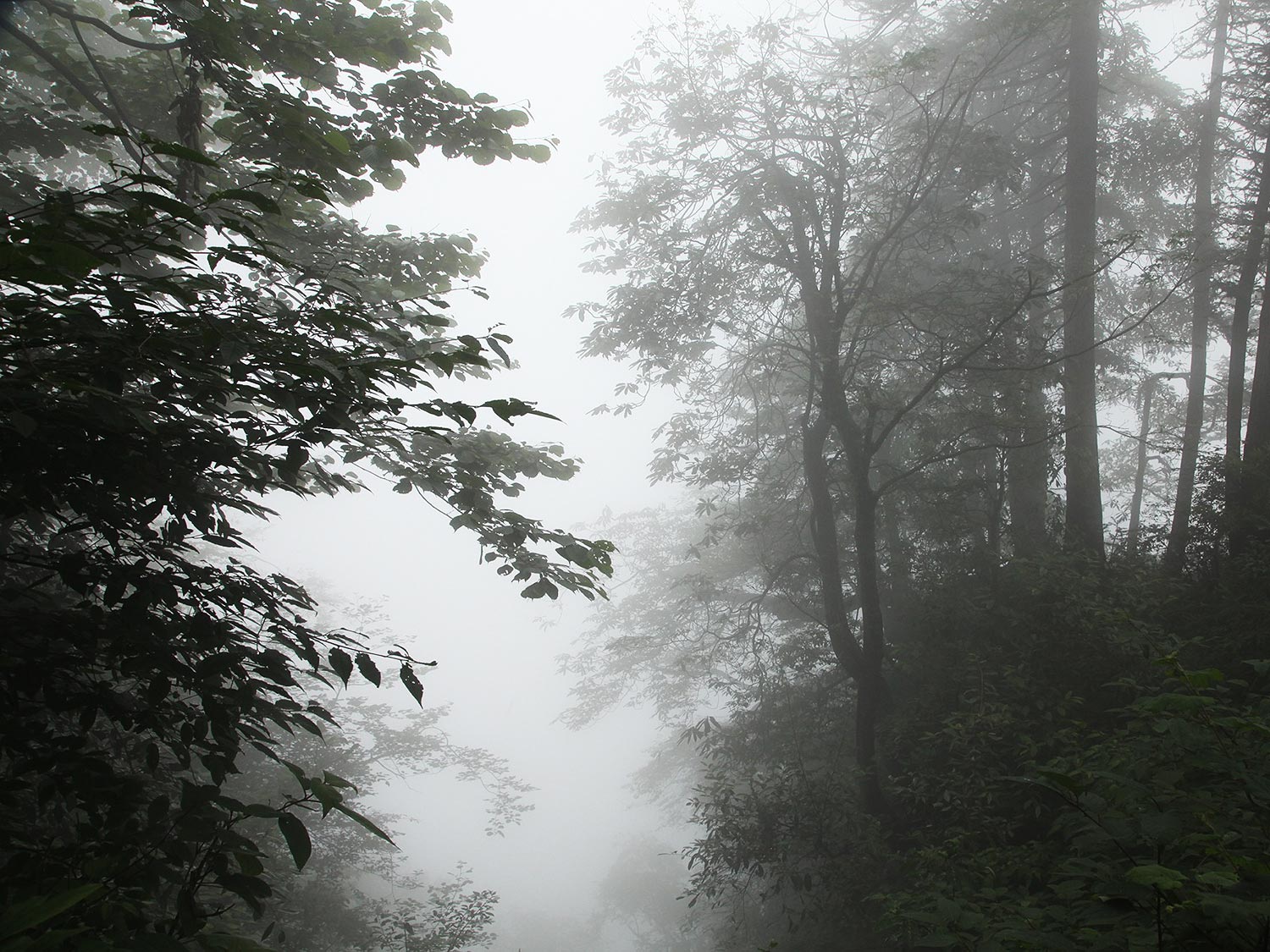
The good thing about walking downhill at a site where most folks make the holy pilgrimage in the opposite direction is that you mostly bump into people going the other way—our day as as quiet and peaceful as the rest of China was busy. Though it was odd: I couldn't help but notice that every time people walked by us, they'd give us a strange look up and down, often accompanied by a little smirk or pause of disbelief.
At first I thought they might find it odd we were walking down instead of up, or perhaps that we were foreigners. Eventually I figured out what it was: they were laughing at our loadout.
While most folks store their bags at the base, brining perhaps an overnight bag with a single change of clothing with them onto the mountain for the trek, we had, perhaps unwisely, brought all of our belongings with us.
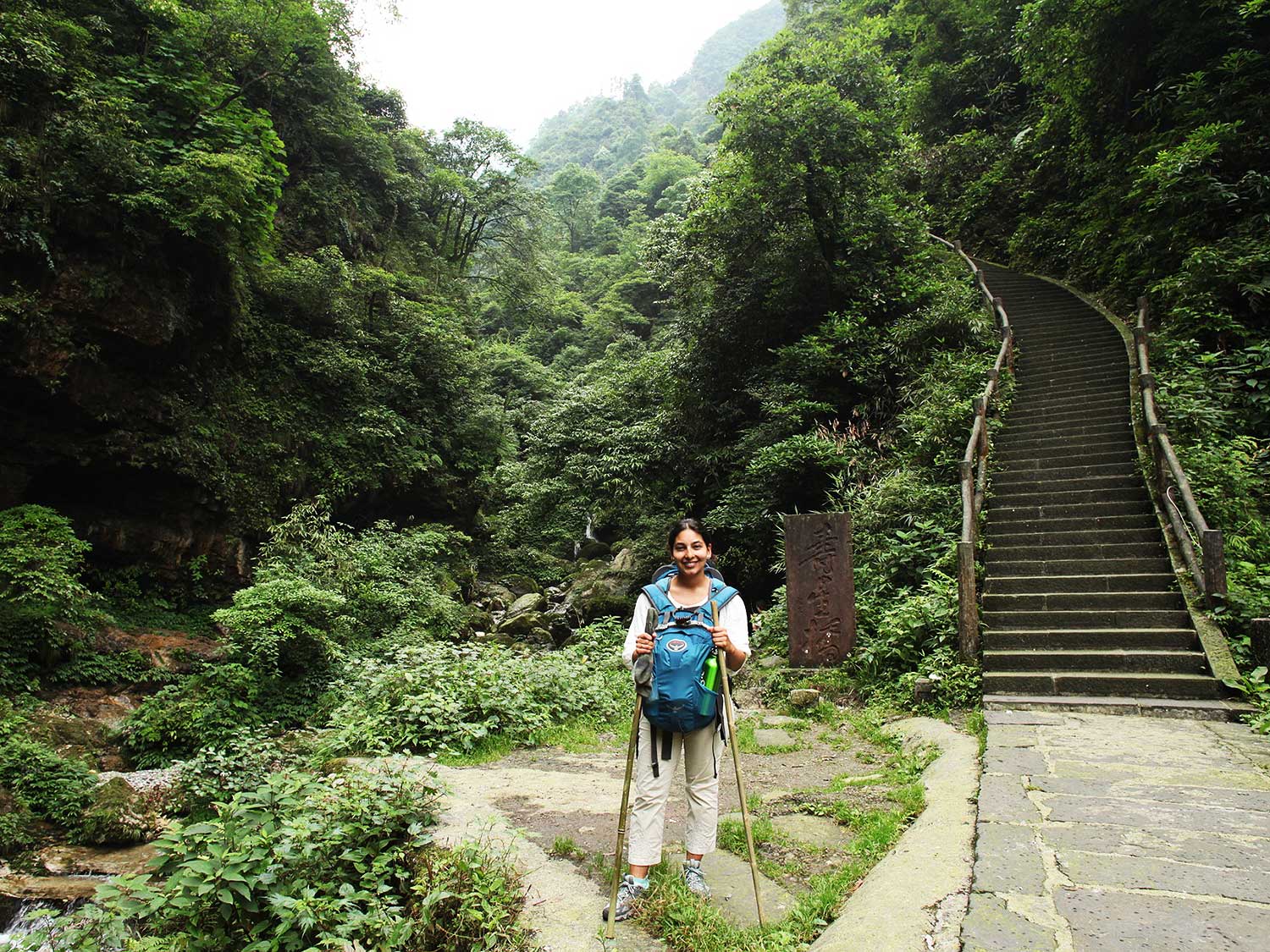
That's two full packs each, with a couple weeks' worth of clothing, toiletries, books, medicine, a laptop, a couple of iPads, water bottles, extra shoes, a full-sized DSLR camera with an extra lens, and everything else that you need for a 10 week backpacking trip—a little over 40 pounds of gear apiece, worn on the front and the back. It wasn't the easiest way to hike 30 kilometers with over 2,000 meters of altitude shift, not counting the snaking ups and downs the path takes.
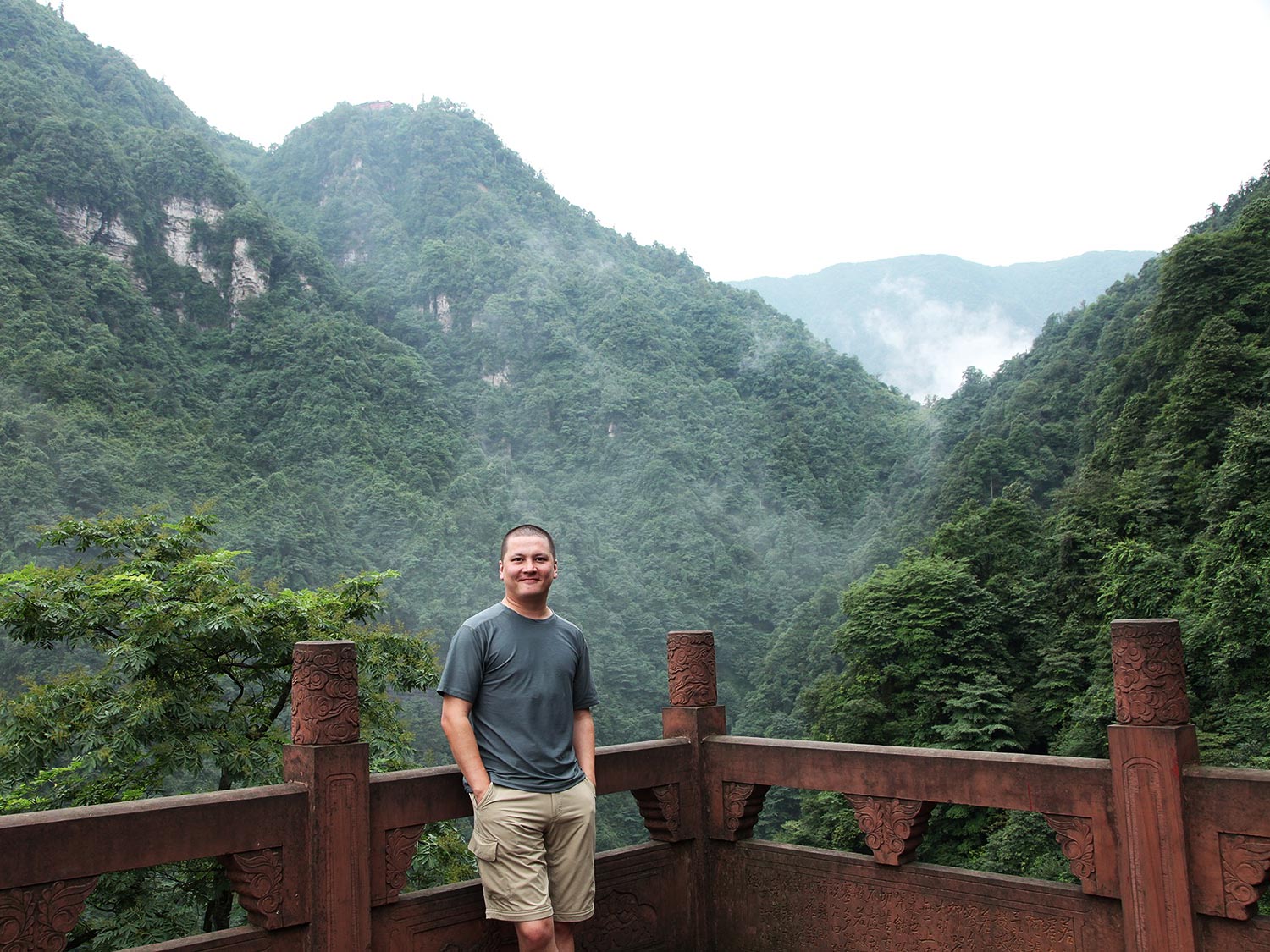
By the time we stopped for the night about 4 hours into the trip, we were beyond pooped.
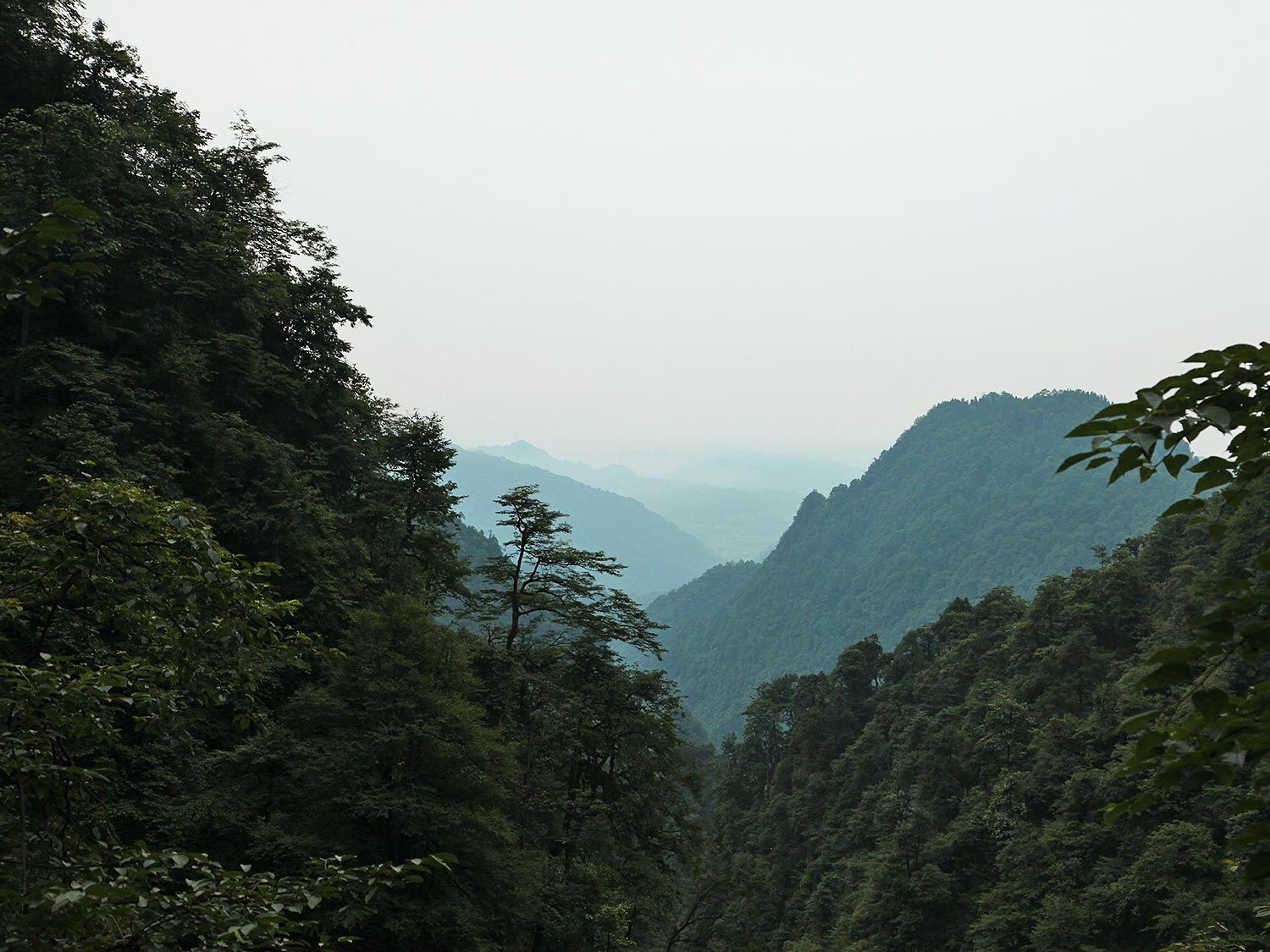
Accomodations on the side of the mountain at Yuxian temple are as utilitarian as it gets. Simple wooden bunks, squat toilets that empty out onto the side of the mountain, and a shower. Dinner was a simple but surprisingly entirely vegetarian meal with some smoky, spicy eggplant, charred cabbage, steamed green beans, and lettuce in a savory broth with plenty of rice.
We ate up and passed out, waking up the next morning at 6AM, our joints creaking in pain, thinking we'd be back in Emei in time to catch a 1pm bus to Chongqing.
But it was not to be.
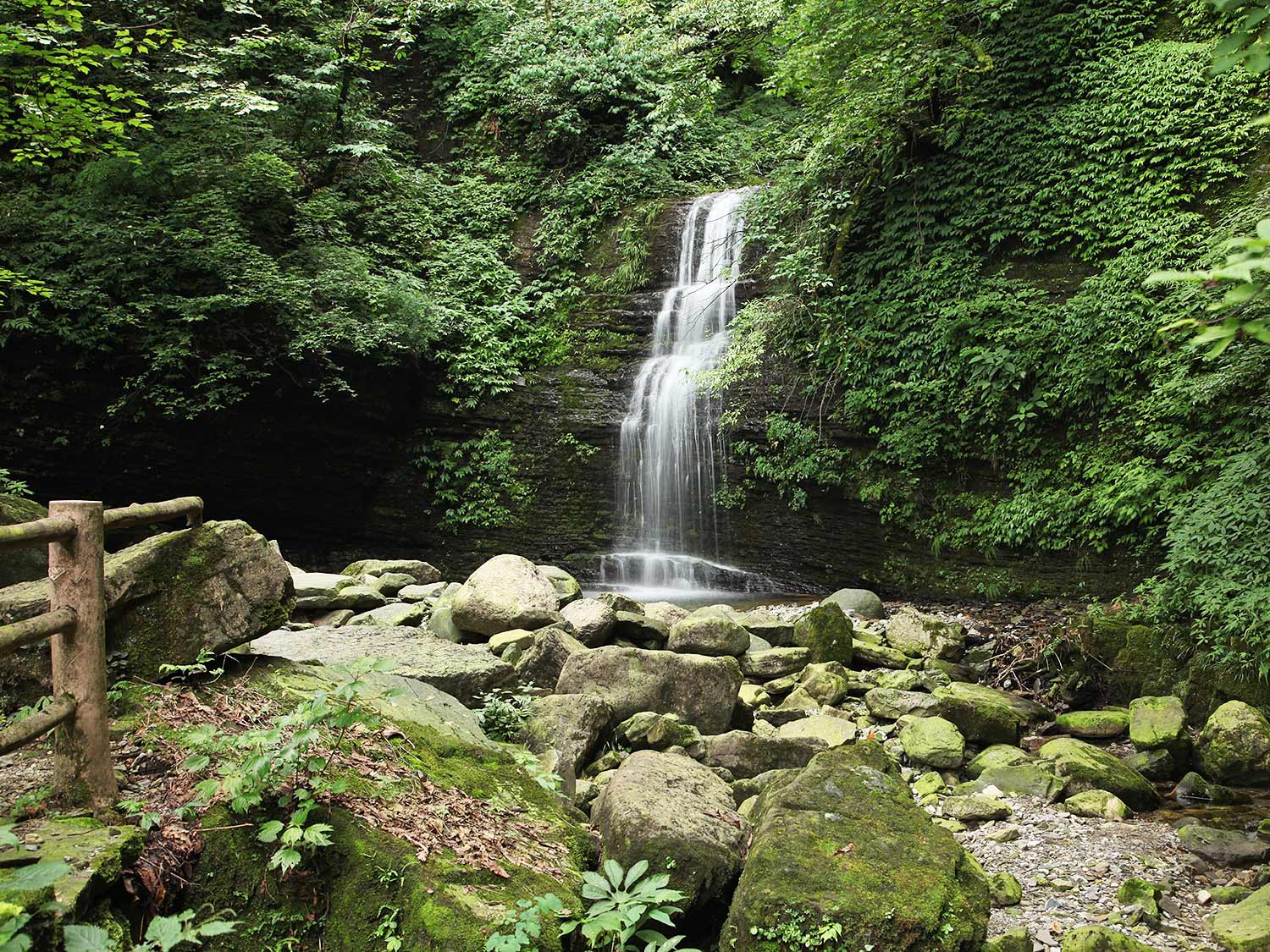
The second leg of the trip was, if anything, even more gorgeous than the first leg as a largely coniferous forest slowly gave way to deciduous trees and shurbs, small waterfalls and creeks slowly winding their way around the path.
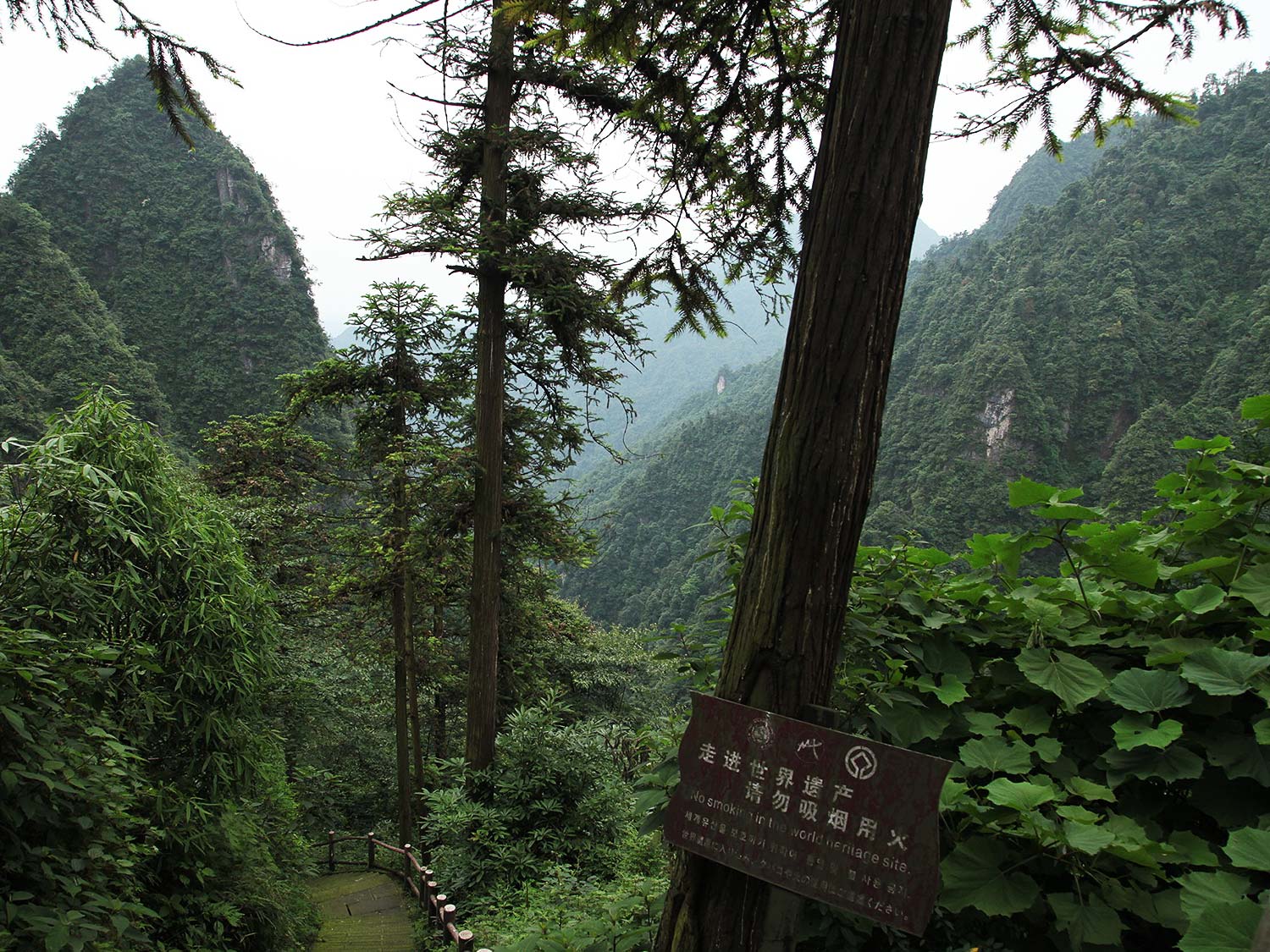
Our legs had long since transitioned from the oh-my-god-this-hurts-so-much phase, through the crap-my-legs-are-shaking-and-I-can't-stop-them phase, and into the phase where they simply give up attempting to tell you that you are putting them through something they were not designed to go through and resign themselves to their fate.
A day that started with a good hour of walking into spiderwebs (the early bird may catch the worm, but the early hiker is the sucker who clears all the spiderwebs for everyone else to follow) with almost unbearable pain in my joints became positively joyful when we made a brief pitstop to soak our feet in an ice cold, clear mountain stream.
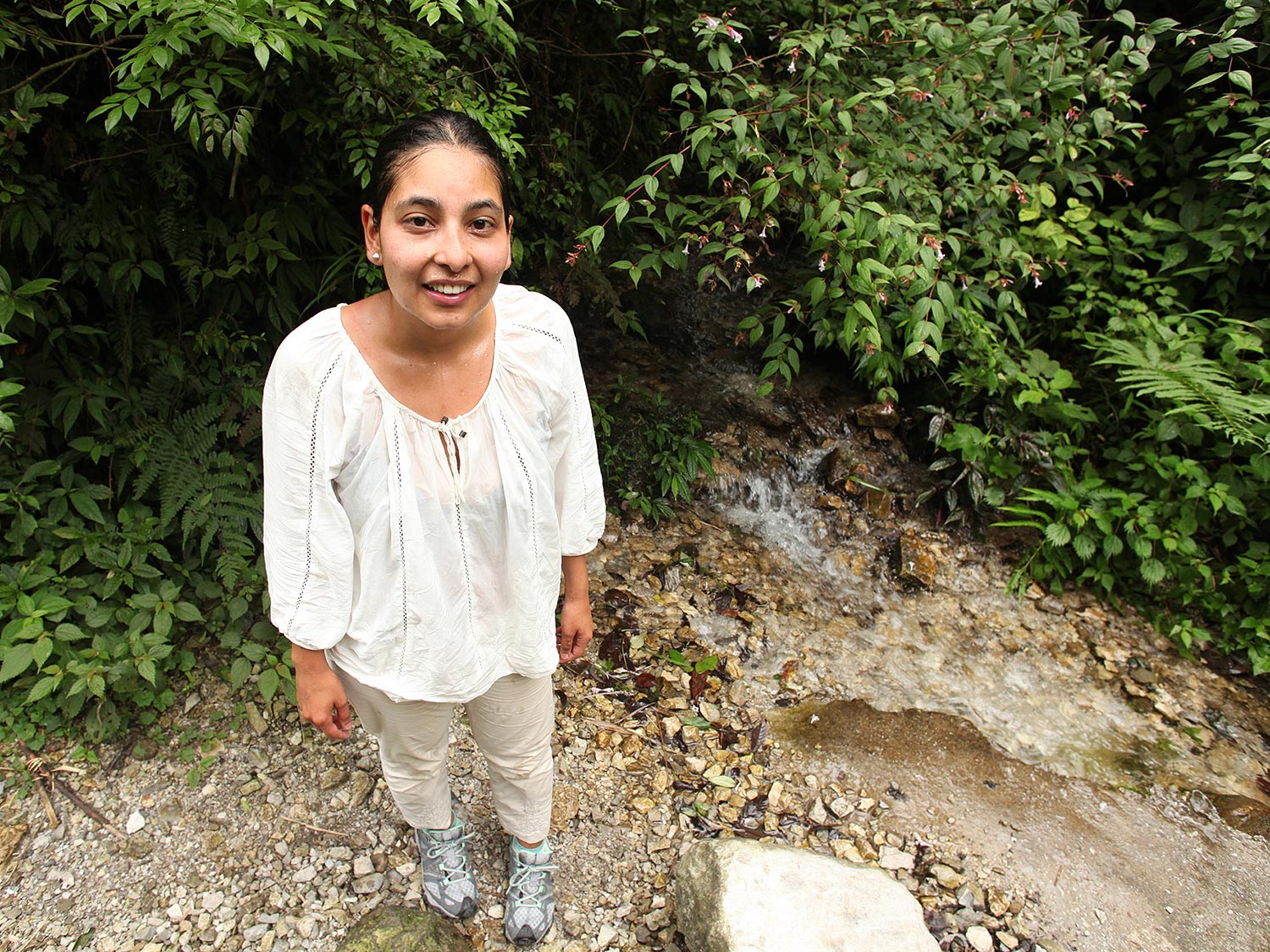
As the day wore on to near noontime, we started hearing shrieks and yells from humans up ahead. We'd made it down to the so-called "Ecological Monkey Zone," which is a mistranslation of the Chinese phrase meaning "zone where two groups of equally assholish primates can freely harass each other."
It turns out that earlier, when I gave humans a pass and decided that the macaques were the jerks on this mountain, I was not entirely correct: we came across a group of a dozen or so high school-aged kids who were alternately shrieking at the monkeys and attracting them with bags of peanuts, then threatening them with sticks and slingshots.
No wonder these monkeys are such jerks, I thought to myself. I'd be a jerk too if I spent my whole life being teased like this.
Adri and I quickly separated ourselves from the other humans and started walking away until we found this little guy playing with a slug:
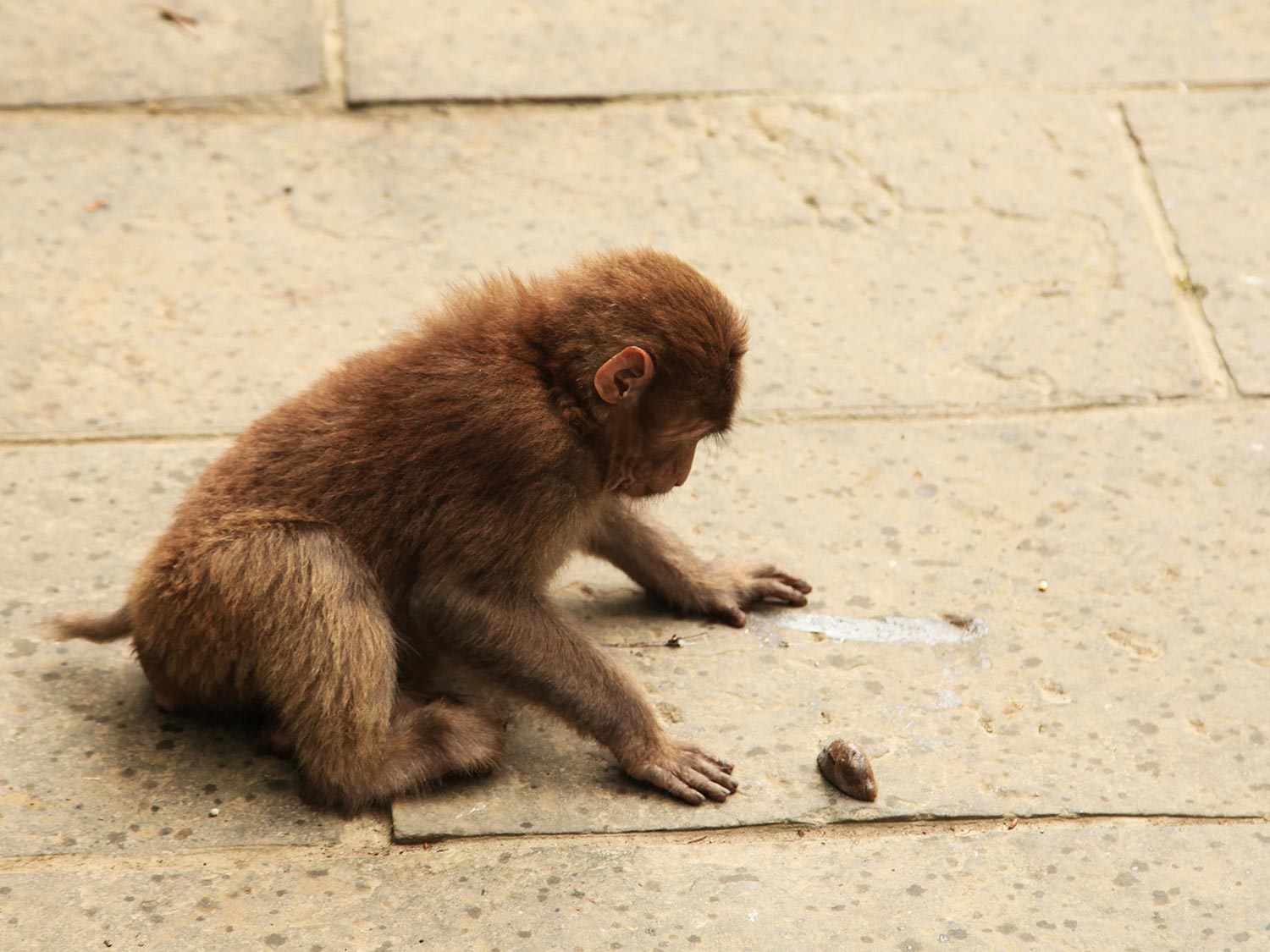
As I squatted down to take a quick picture of him, along with another quick snap of a mother and her infant, I didn't notice the big ol' scarface sneaking up behind me until it was too late.
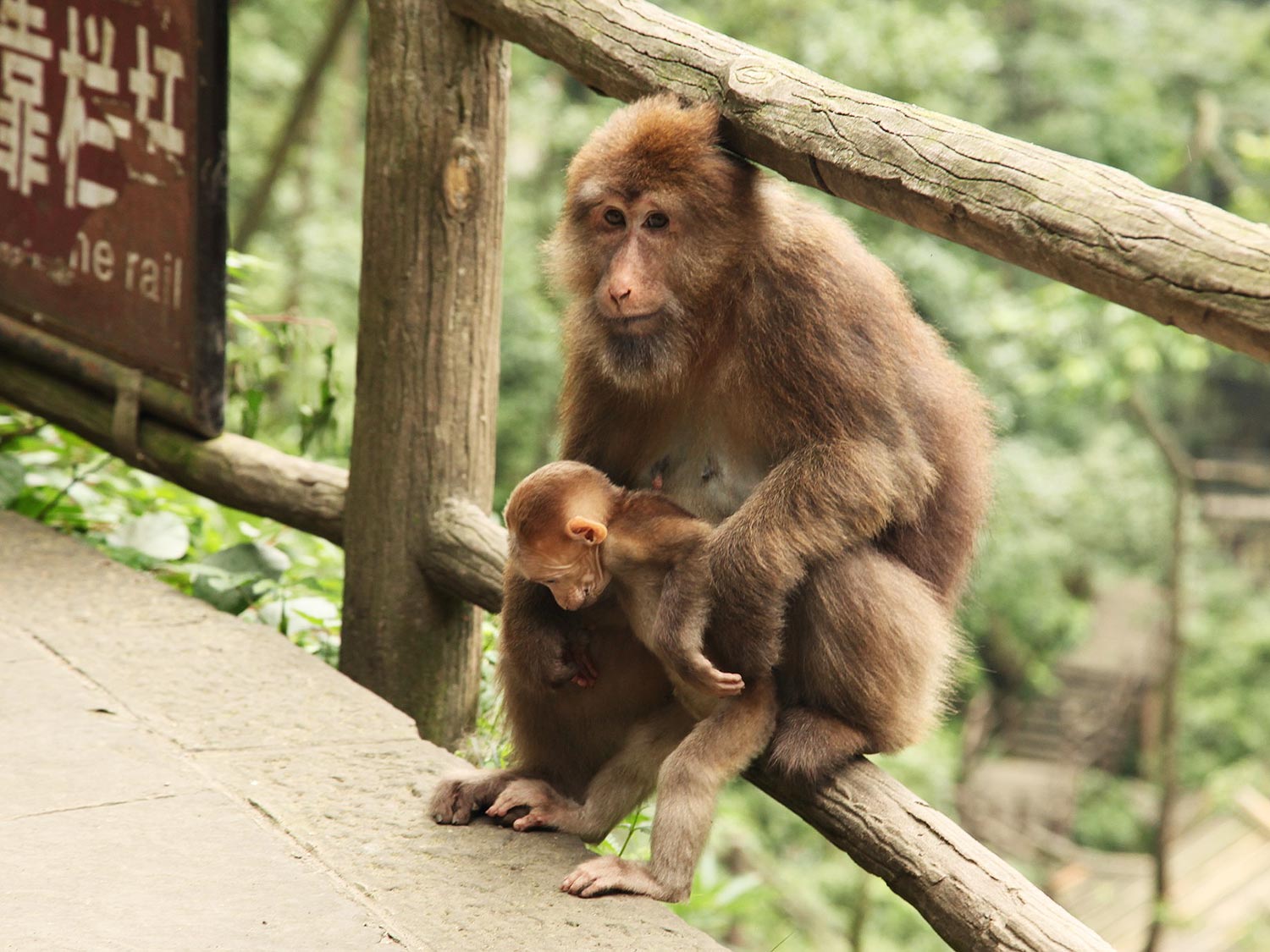
He made a grab for my camera, which I had to yank back out of his hands. He lunged for my hat and hissed at me as I tried to back away, discovering that I was surrounded on all sides by a good 12 monkeys and that Adri was in a similar situation a little further up the path.
The old geezer made one last grab, this time for my backpack where he managed to grab hold of my water bottle and made off with it. I vaguely remembered reading a sign post a few kilometers back that had warned us to stay in a group and carry a large rock when approached by monkeys.
I found a lose stone by my feet and picked it up, immediately causing the monkeys to scatter and glare at us from a few meters away.
Adri and I backed away slowly, watching as the old fellow deftly unscrewed my water bottle using his hind legs and his teeth.
Death by monkey is one of those phrases that probably looks way cooler on your tombstone than it feels in real life.
The good news was that the pack of teenagers we'd run into were on a day trip from the base of the mountain, which meant that we only had another 5 to 10 kilometers to go.
At this stage, the path in the mountain splits, with one path taking you back towards Baoguo village, and the other, slightly shorter path taking you to a bust station where you can catch a ride the rest of the way. Feeling our feet getting ready to give out, we decided to take the shorter route.
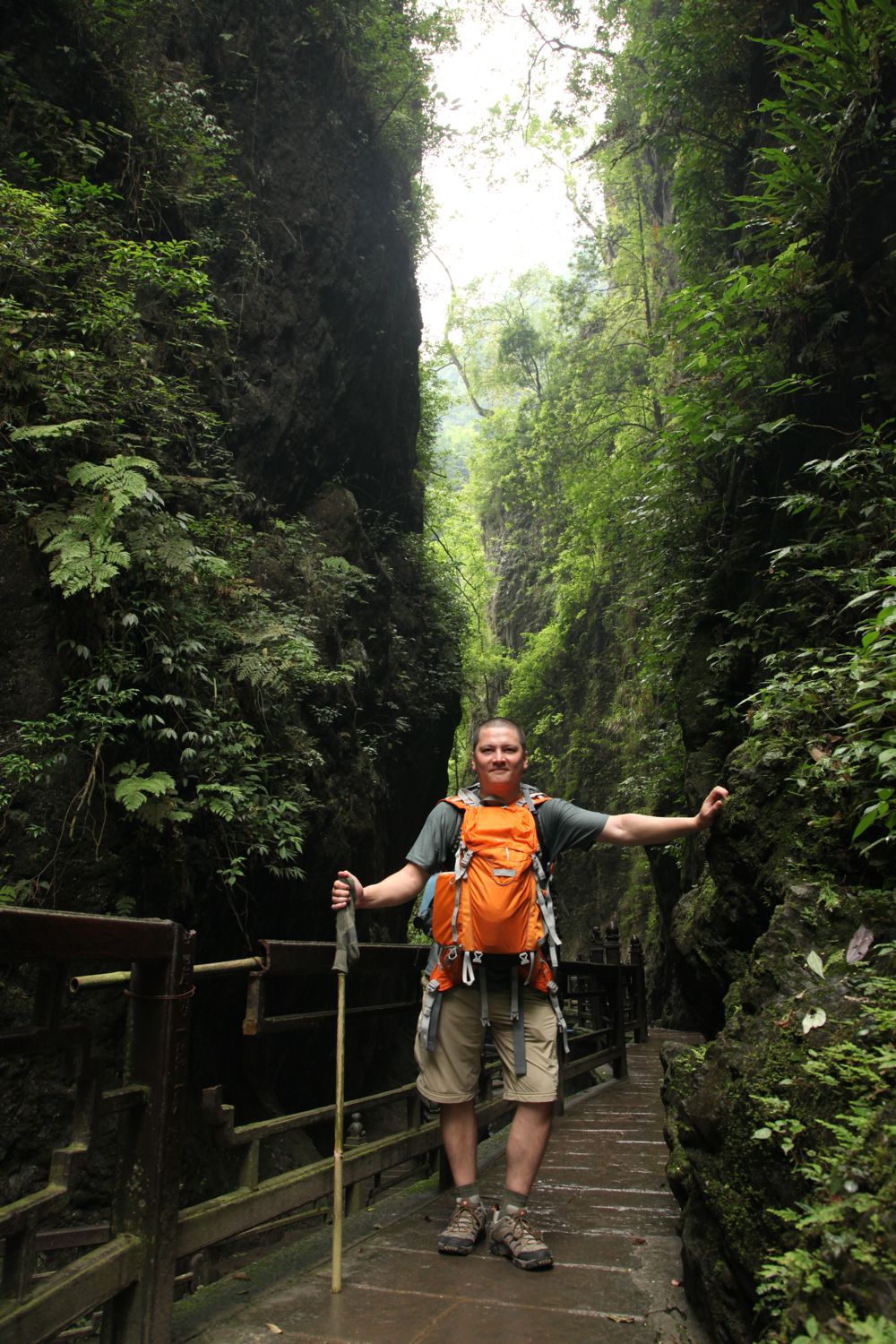
It all started out well, with paths through deep gorges and river walks that were if anything the most beautiful part of the walk yet.
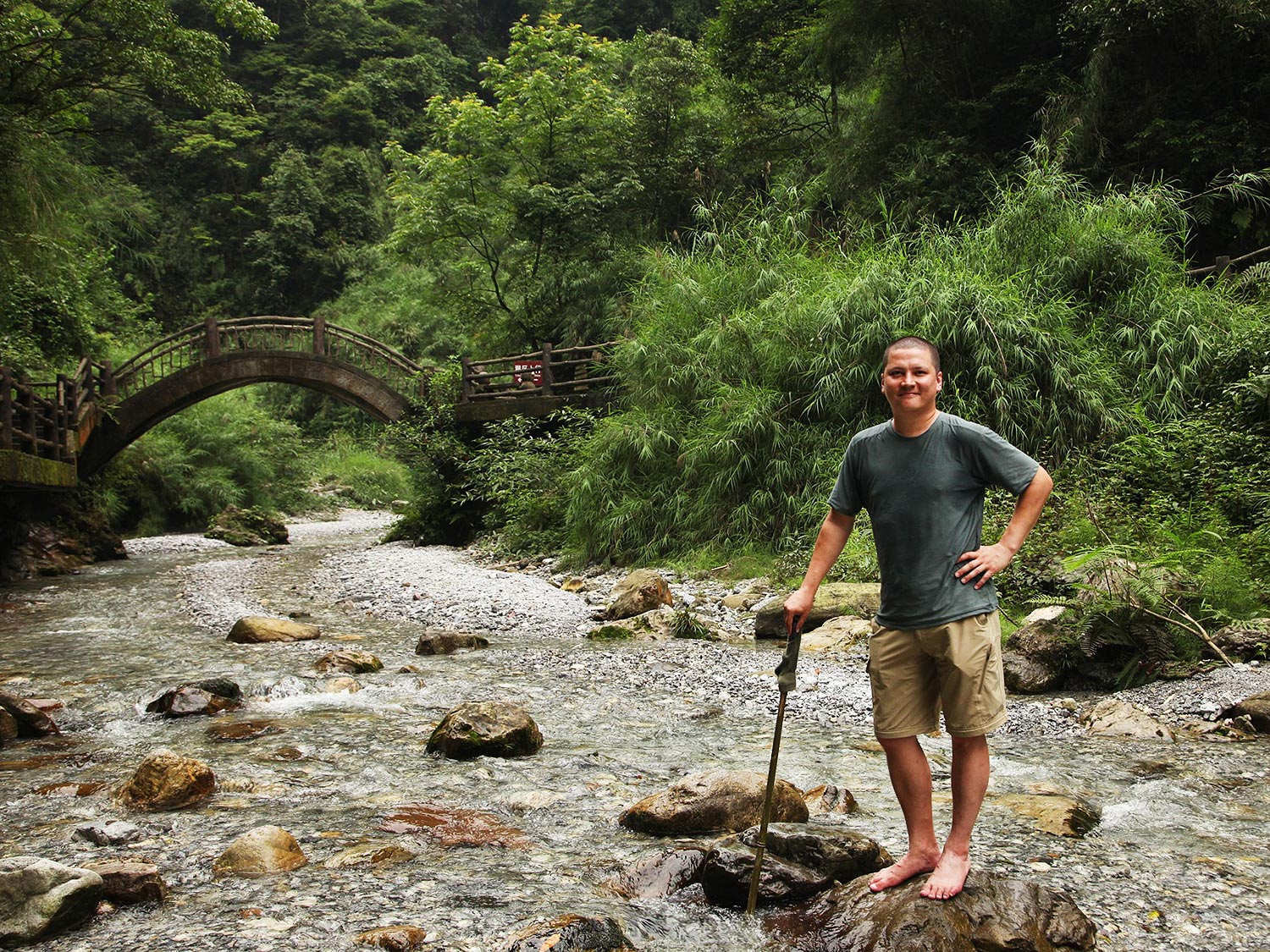
I even got to strip down to my underwear for a quick shower under a gushing waterfall.
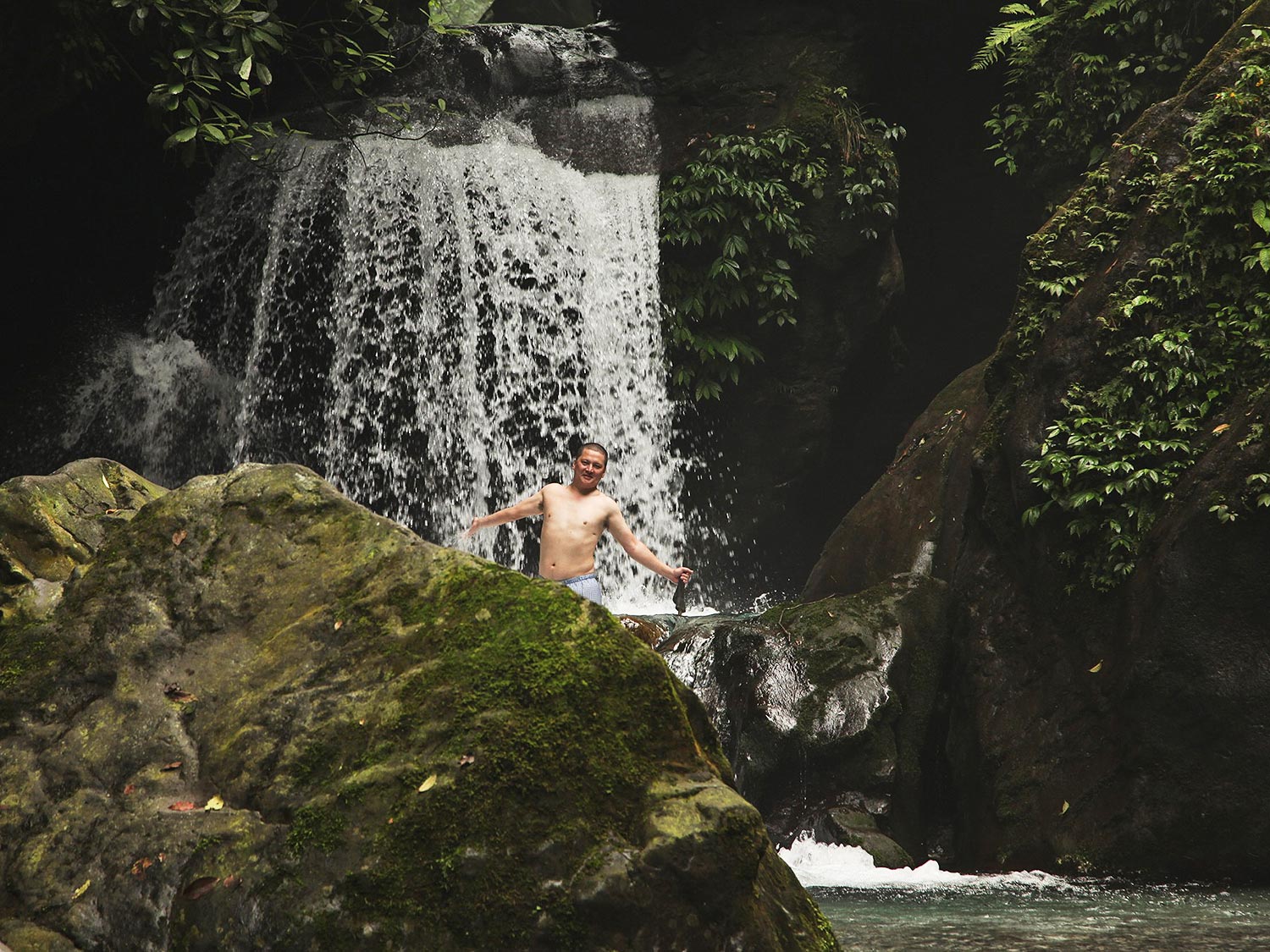
A shower that was only partially interrupted by a Chinese couple who didn't notice me in the background.
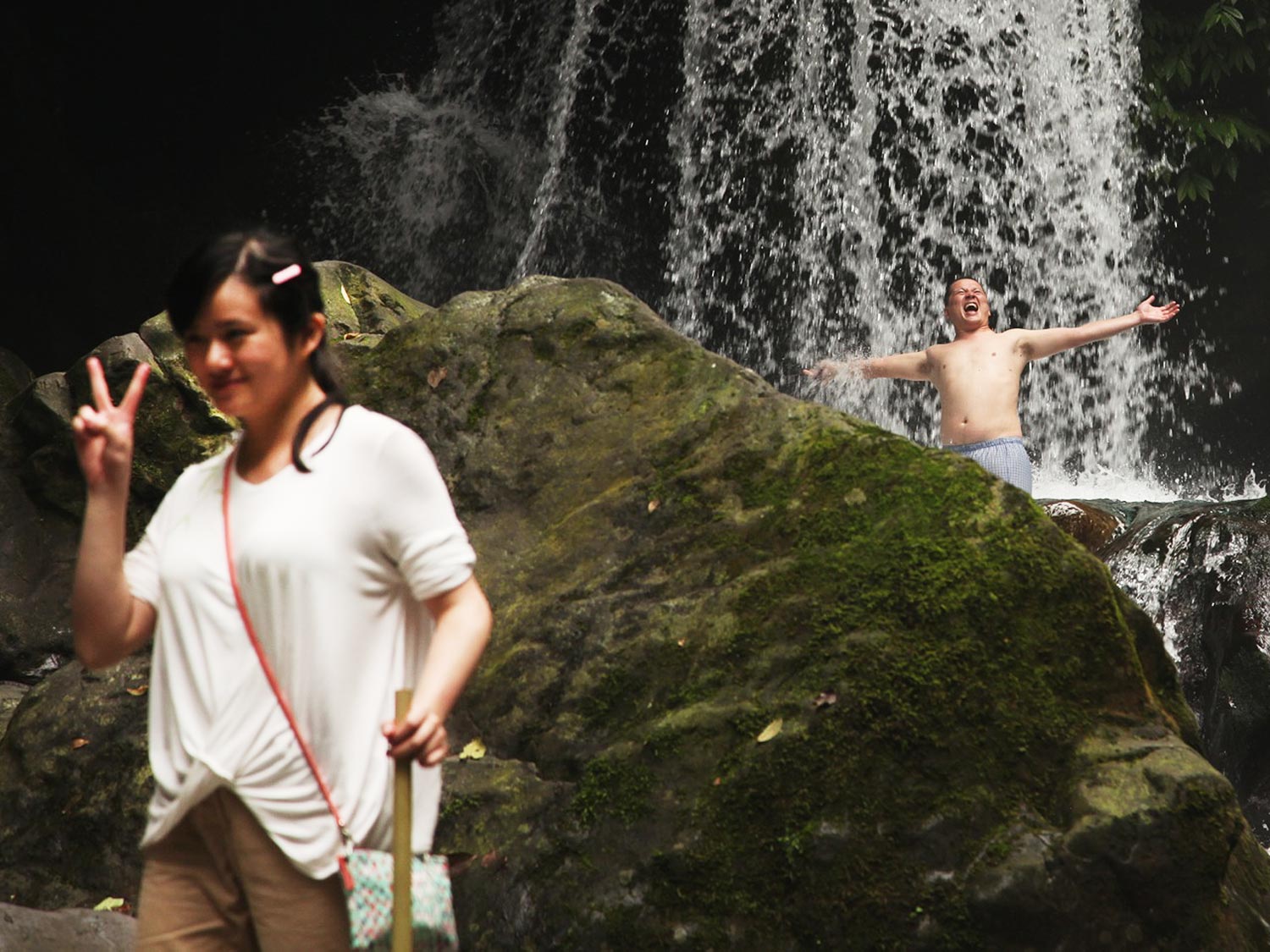
We were in great spirits as we passed this pretty pagoda on a small formation reached by two bridges:
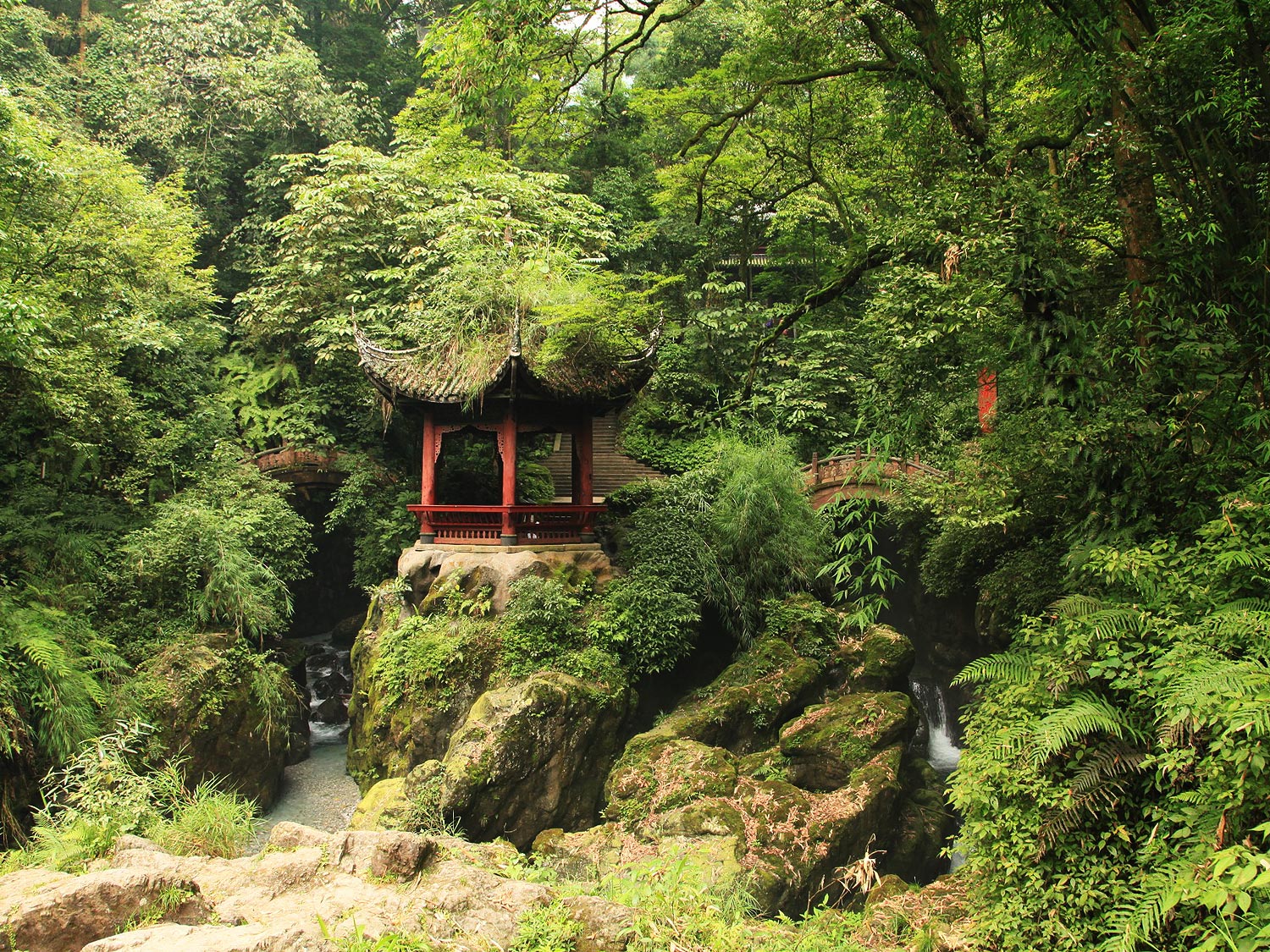
Pretty, right?
We reached the small town near the bus station and noticed that it was surprisingly quiet. Isn't this a tourist town? Shouldn't there be, like, vans and taxis and all manner of transport ready to take our money to deliver us to wherever we'd like to go?
Instead, there was a deserted parking lot and a big chain around the door of the bus station.
Several of the small towns in the area, including the one that houses the bus station, were in the middle of protests against the government turning their small farming communities upside down with the increasing tourism that Emei Shan is drawing. In other words, the two tourists who randomly showed up in their town were the two folks least likely to find anything by way of help there.
The best they could offer us was a finger pointed down a steep staircase as they said Baoguo.
It doesn't look like that path leads to Bauguo we thought to ourselves as all hopes of making it to Chongqing that night left our minds. But what choice to we have?
We started down the staircase sullenly, our feet leaden and our wills battered, just as it began raining.
The road was hard going. Unlike the well-trodden stone pathway up to the top of the mountain, this path seemed like it hadn't been used in years, probably because it hadn't. The guardrails had long since collapsed, leaving cracked concrete stumps. The stones were covered in a thick layer of moss, trees and grasses sprouting up between them. That's when they were there, at least. In many spots, the stones had been completely swept away, leaving a wall of rocks on our right and a steep drop-off to a rocky, flowing river on our left, with streams and waterfalls cutting across our path.
What few structures we came across were abandoned, their wooden roofs long ago rotted in, their moss-covered walls crawling with centipedes.
Remember those goofy Chinglish signs we saw earlier up on top of the mountain? If only there had been a handrail for us, loving life, at this moment to not turn round. Unfortunately, all there was blocking us from the slippery fate of a hundred meter drop was the questionable grip our shoes held on the mud-slicked stones.
I'd never feared for Adri's life more than I did during those last couple of rainy hours. The worst part was not knowing how far we had to walk, or even knowing if we were heading in the right direction. My worst fear was that we'd end up at a dead end, forcing us to retrace our footsteps as it started to get dark.
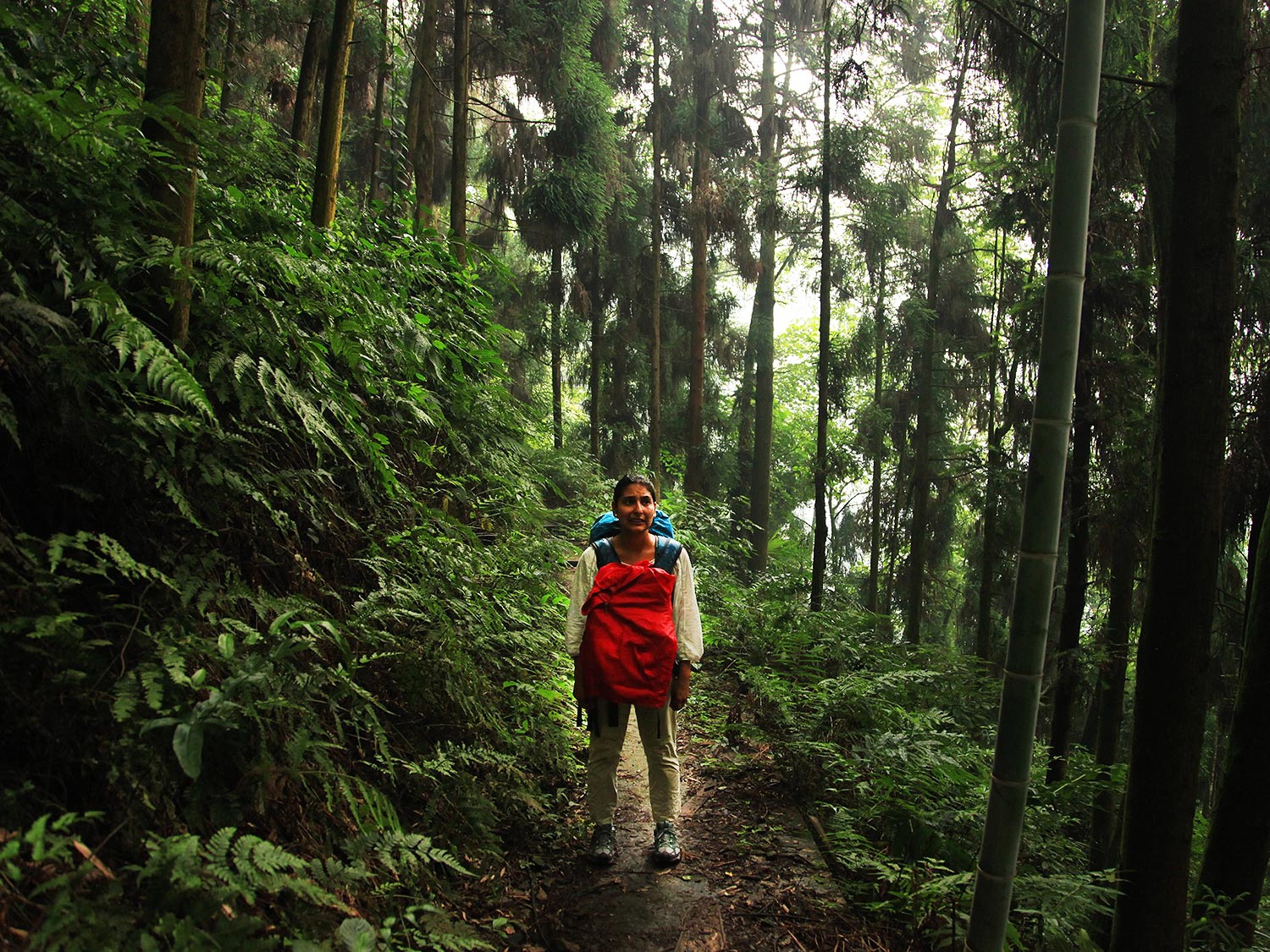
Finally, we heard the sound of trucks up ahead, as other signs of civilization started appearing. Stairs that had been recently swept. Small concrete houses with laundry hanging up outside. Wires strung up with runner beans and squash.
The path eventually deposited us on the side of a highway where we spotted a police car, monitoring a nearby town in case the protests got out of hand.
We dug out our guidebook, looked up the phrase for "Help me please, I'm lost," did our best to ask them for a ride to Baoguo, and were met with a finger pointed along the highway.
With desperation we tried explaining to them that we were so tired and shaken up that we could barely stand, but were met with blank stares.
We started walking down the highway, thinking that at least on paved road, it wouldn't be so bad. We failed to account for the craziness that is Chinese drivers. Adri and I walked, pressed as close up to the guardrail as possible when I saw two cars emerging from a corner in front of us at high speed, one of them overtaking the other.
I mentally gauged their distance and determined that we were safe at our current position. Then I realized that there was a third car, and it was overtaking the car that was already overtaking the first car. They were now driving three-cars-wide down a one lane highway on a curvy mountain road at high speed.
The third car was forced to drive not just in the oncoming traffic lane, but to actually hit the opposite shoulder in order to perform his daredevil stunt. This is all while Adri and I were walking in that shoulder. We dived up onto the guardrail protecting us from a drop to the river below.
This time, I'd never been more afraid for my own life.
That's when we said fuck this, we're hitching a ride back, no matter what it takes.
Pro-tip: When hitching a ride in China, putting your thumb out will only get drivers to enthusiastically thumbs-up you back. Similarly, waving will get you plenty of smiles and waves, but no rides. If you want to get a ride, stick your hands out in front of you with your palms facing downward and slowly wave at the floor. Or better yet, do what we did: jump up and down waving your arms frantically like a man on a deserted island who's just seen a low-flying plane pass by.
We finally got picked up by a family of four who happened to have a couple of spare seats in their van, which was decorated with a big, gold, grinning Buddha on the dashboard. The man driving asked us for 30 Yuan (about $5) for his troubles. We gladly would have payed him anything he asked at that point.
Our bus to Chongqing had long since left, so we decided to spend the night in Baoguo. Our hostel, the Teddy Bear Hotek, turned out to be one of the nicest on our trip. As we checked in and started walking up to our room (please no more stairs!), we could hear the desk clerk telling another backpacker "you must go to this bus station, because the other one is closed for protests."
If only we'd known.
Only once we'd showered, drank a couple of beers, and filled up on some Mapo tofu from the restaurant down the block did we feel relaxed enough to take stock of the days events. Despite all the pain, trauma, and fear-of-death involved, it was, up to then, the best two days we'd had in China, with the kind of natural beauty we'd expected to see before coming here. Even now, as I write this from the upper deck of a train in Thailand on our way from Nong Khai to Bangkok, I feel the same way.
It's a trip I'd recommend to anyone with an appreciation for nature and a desire to put themselves through a bit of healthy pain, though I'd suggest you learn from our mistake: if you plan on climbing up or down the mountain, spend the night before in Emei or Baoguo and take only a light bag with the bare essentials with you. And for god's sake, make sure to check on those bus stations!
It's a particularly nice trip to make if you want to get away from those sites that attract lots of foreign tourists. Once we got away from the very peak of the mountain near the bus station, we only ran into two non-Chinese tourists during the entire two day ordeal (and one of those tourists mistook me for a Chinese tourist—it took me a while to understand why an American had said nihao to me as he walked by).
Epilogue
Later on that night I decided to reward myself for two days of good exercise with a massage at the one fancy hotel in Baoguo. What I got was the absolute least relaxing massage I've ever had in my life. The room itself was gorgeous, the massage chairs were soft, clean, and comfy, and the masseuse seemed to know what she was doing—at least, when she wasn't checking messages on her cell phone. But man, is it difficult to relax when four hotel employees are watching Chinese sitcoms on TV with the volume at full blast in the same room where you're getting your massage, all while eating, burping, clearing their throats, and spitting directly on that gorgeous marble floor.
WTF, China?